#especially having a understanding of how subtext actually works
Text
Okay, but what happened to the concept of two men being best friends & platonic soulmates, willing to sacrifice their career or their own happiness or even their life for the sake of the other? Out of strong loyalty and the kind of love the Ancient Greeks termed philia (as in Philidelphia, the City of Brotherly Love). I've experienced that kind of love with several female best friends (at different stages in my life) - and at no point did either of us yearn for some kind of sexual relationship.
Is online culture telling me that males are incapable of the same, by interpreting male friendships in media (including in well-known pieces of literature) as 'of course they want to have sex with each other!'? I can't accept that premise. My own brother has been best friends with the same dude for 25 years (since first grade) and they refer to themselves as 'brothers from another mother'. I'm not anti slash ship or real world m/m romantic love, but sometimes...sometimes I just get so tired being told 'OF COURSE THEY'RE DOING IT!!!'.
#will I get flamed? dunno#just read a thing about#Amok Time#apparently the progenitor of m/m fics#now I maintain Ship & Let Ship#but sometimes I just get exhausted of being on the fringe of how things are interpreted#especially having a understanding of how subtext actually works#and Kirk's exposed tiddies were not subtext#if you watch the whole series you'll find plenty of examples of Jim's 'artfully ripped' shirts#it was always for the ladies in the viewing audience#James Kirk#leading man & tom cat#as Amok Time was the season premiere they wanted to pull out all the stops to keep audiences tuned in#btw - Kirk's tom cattery is the reason that RDA of Stargate-SG1#insisted that his character would not be bedding various alien women on the planets they visited#Jack O'Neill only did that once#and only because he thought he was stranded for life after three months away from Earth#and he had a genuine relationship going with the woman first
6 notes
·
View notes
Text
Okay so I finally watched Good Omens season 2 and have tons of thoughts about it, especially how the minisodes and side-plots do so much work, thematically.
*slaps flashback segment on the roof* this bad boy contains so much subtext!!
And here’s my analysis about some of it:
The side plots are about at least three main themes that I can spot.
1. They are all, in some way, about resurrection. The children of Job. The Nazi Zombies. The resurrectionist. Miracles being rated on a scale of how many people they can bring back from the dead. Even Gabriel, in some way, arriving naked and without his memories and innocent as a babe, then finding himself again was a form of resurrection.
This, of course, has to do with foreshadowing season two, the one where the main plot point is going to be the second coming.
2. They were all about how much it’s a bad idea to mess with humans. All flashback minisodes either had someone die directly because Aziraphale and Crowley were around (Wee Morag, the guy at the magic shop), or almost die because Heaven and Hell said so (Job’s childrens). In present-day time, Aziraphale’s messing about with people during the ball is explicitely called out as creepy and wrong and Nina & Maggie have a talk with Crowley about it.
This leads to my theory that this is also going to be a major theme in the third season. We know that in the book, Adam explicitly tells heaven and hell to stop interfering. We also know that in the show, Aziraphale and to a smaller extend Crowley need to learn this lesson.
I also think that the resolution of the next season is probably going to involve Earth being marked definitely off limits to angels/demons, possibly via the same mechanism that makes the shop into a safe heaven you need to be invited in (and the same thing became true of the Bentley once Aziraphale claimed it! As pointed out here , Shax had to hitchhike to get in, instead of appearing inside as she did before). Earth needs to be claimed. I think that this will happen either by a combined miracle of incredible proportions from both Crowley and Aziraphale after they reunite, or (and this is my pet theory) by a combined miracle of incredible proportions by Adam and whoever is the new Jesus (I am a greasy Johnson truther lol). This would make Earth a place that you need to be invited in order to go there, and therefore safe haven for angels and demons who promise not to cause trouble.
3. All of the side plots and minisodes are about misdirection. Sleight of hand. Smoke and mirrors. Magic tricks. Showing one thing while something else is true.
This is shown obviously in the Job part and also in London 1941, with the party who is getting tricked being heaven and hell, respectively. Meanwhile, Gabriel and Beelzebub are trying to trick everyone. But who is tricked by the plot lines of Nina/Maggie, and Elspeth/Wee Morag?
We are. The audience is.
It has been pointed out here and here that Nina is meant to make us think she’s a parallel to Crowley when she is actually more of an Aziraphale thematically, and vice-versa.
But what about Elspeth and Wee Morag? We have one that robs graveyards, and one who tells her that is wrong and is worried about her eternal soul. That seems straightforward enough as a mirror to Crowley and Aziraphale, no? Well, let’s just look at what they’re doing and saying to each other, shall we?
“Don’t do this incredibly wrong and dangerous thing. It will have repercussions that you can’t even begin to understand right now.”
“I’m doing this for you! You deserve better than this life!”
“I don’t want the better life you’re offering. I would rather huddle with you here, homeless and poor but knowing you’re safe and that we’re together, than to know you alone out there doing horrible things you’ve convinced yourself you need to do.”
“I do need to do it. Trust me! This is going to fix everything! And if you don’t want me to be alone, then come with me. There! Problem solved!”
(Problem very much not solved.)
Doesn’t this sound, a tiny little bit, like a certain season finale to you guys? Elspeth was, in fact, Aziraphale all along. She thought she knew what was best, and she barrelled along without listening to anyone else, and then it went horribly wrong.
There is a reason why both times this season that we see Aziraphale fucking up someone else’s plan (the corpse to sell, Crowley’s contraband whiskey) because he initially reads it as a bad thing and thinks he’s doing good by destroying it, without having the full context, it backfires on him and then the situation has to be fixed. He needs to stop and understand things properly before taking actions. He needs, in short, to ask questions.
We see that the one time he did ask questions before acting was during the whole Job thing, and it worked out the best out of all the sub plots this season, right? … except that Aziraphale was convinced that he would Fall for his actions there. The way Crowley had fallen for asking questions.
And if the only person whose assessment of the situation matches Aziraphale’s is a demon, if the only one who is doing what he personally thinks is the Right Thing is a demon, then gosh… either that means that Aziraphale himself should therefore also be a demon, OR it means that Crowley shouldn’t be one, and this was all just one big misunderstanding, and maybe if I just speak to the manager…?
#good omens#good omens spoilers#go2 spoilers#go 2 speculation#good omens meta#meta#good omens season 3 speculation#good omens season 2#good omens season 2 meta#good omens analysis
819 notes
·
View notes
Text
Violent Delights Have Violent Ends
Pairing: Spencer Reid x Fem!reader
WC: 1.8k
TW: Serial killers, murders, blood, referencing to infidelity,
A/N: This has been something I have been thinking about for a while. I hope y'all enjoy it!
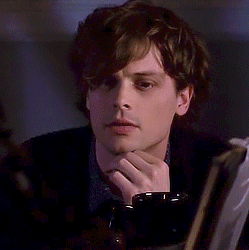
Spencer did not realize that someone could know more about anything intellectual than he did. It honestly baffled him, when Hotch called him into the office, to introduce the two of you.
“Spencer this is Doctor Y/N Y/L/N, Doctor Y/L/N, this is Doctor Spencer Reid.”
He gave you a small smile, and a slightly awkward wave. You were beautiful, there was no doubt about it, an absolute plus to the fact that you were intelligent. He was captivated by your eyes but quickly coughed and looked back at Hotch.
“Doctor Y/L/N—”
“Please Agent, call me by my first name after the initial introductions, Doctor makes me feel a tad bit ridiculous after like the second time.” You couldn’t have been more than twenty four, Reid deduced.
Hotch smiled at you, nodding. “Please, call me Aaron, or Hotch, I feel the same way about agent. Reid,” He turned towards Reid. “Y/N, is going to be a consultant on this next case, and you two will be working closely together.”
Reid was suddenly excited by the prospect of working with a consultant. He usually dreaded them, but something about you made him excited to actually be able to converse intellectually with someone on the team.
But luckily for Morgan, you were not what anyone was expecting. You all had boarded the jet, sitting around and chatting since you had a long flight from DC to Oregon, not really willing to get into the details of the case just yet.
“So, Doctor Y/L/N, what made you choose Shakespeare?”
You rolled your eyes. “Agent Morgan, if you keep using my official title, you’re going to be talking to the wall. Wanna try again?”
His jaw dropped slightly, enjoying the banter you were providing. Derek Morgan was far from ugly, far from it. But he simply wasn’t your type. But that did not mean you couldn’t flirt back.
“Well then, Miss Y/N, why Shakespeare.”
You smiled, “Shakespeare is just another language. And I already speak French, Arabic, Spanish, some Latin, a little Greek, and I’m learning enough Mandarin and Cantonese to get by on my next trip to China. So understanding Shakespeare from a linguistic point, I’ve already got covered. Especially since it was something I could read easily from a young age.”
JJ and Emily had stopped their conversation and turned to face you, eagerly listening in to what you have to say.
“But, from a theatrical point, his writing is so incredibly intricate. There are layers upon layers of text and context and subtext throughout all of his plays and sonnets, not to mention the fact that Shakespeare can be transformed, moved from one thing to another incredibly easily. You have to factor in that he was a misogynist, anti semitic, probably-most-definitely racist, among all of the other things, but adapting his works throughout time is something I have a special interest in, particularly his portrayal of woman and how that has been changed throughout productions over the years, mainly focusing in comedies and this strange need for him to have happy endings end in weddings.”
The jet was all staring at you, while a smirk slowly slid onto Derek’s face. “Looks like you got some competition here, Pretty Boy.”
You shrugged at Derek, and looked back at your phone. “I appreciate competition more than meaningless run-around conversations Derek. If you’re going to profile me, then just profile me. Or google me really. There’s no need to prod and pretend like you’re not trying to find out whether or not I’m single. If you wanted to ask me out, you should just ask me out.”
Jaws on the plane dropped. Derek tried to stutter out a response but was cut off by Emily, smirking over at him. “Besides consulting on murder cases, what do you actually do with a PhD in Shakespeare?”
You looked up at Emily and shrugged. “Whatever I really want to do. It’s just flexible enough that I can bullshit a job I want and take it, excluding present company. Usually I consult in England with the Globe Theatre and the Royal Shakespeare Company, I also guest lecture Shakespeare for younger audiences, like high schoolers and first years in college because I’m still young enough that I could be considered nerdy by a high schooler, but have college freshmen not be able to talk to me because I’m just good enough to get away with it.”
“What did you get your undergrad in?” Spencer spoke for the first time to you since you met him, you smiled a little bit.
“No one really asks me that.” You looked over at Spencer. “I have a bachelors in Directing with minors in English Literature, French, and Classics, and then I went on and got my Masters in Art History, since the visual aspect of the Arts is what interests me so much.”
Rossi nodded, “Makes sense considering I’ve seen your thesis–very impressive.”
“What did you write about?” JJ looked over at you.
“I–” You started but Rossi interrupted you. “Actually, if any of you had done any research, or were familiar with the Theatrical Arts, you would know that her thesis was an incredibly well-received production of Hamlet that delved into the female psyche and experience.”
Your jaw dropped slightly. “I-I didn’t think you, any of you would have even known that. Let alone had time to go and see my production?”
“Well, I have a fondness for the arts.”
You shook your head. “Or incredible timing.”
“Wha–timing?” JJ scoffed.
“Well,it’s— the program was in London, and it was only running for a few weeks…”
“Rossi when the hell did you go to London?” Derek finally spoke up, slightly captivated by you, but not in the way Reid was. You were something else, something completely new, which meant he could learn, and you were something he wanted to learn everything about.
“Well, right before I rejoined the BAU, I did a lecturing series over at Scotland Yard, and everyone had been discussing this production by the youngest female director to ever direct at the Bridge Theatre. I loved your use of, what were they, silks?”
You nodded, slightly embarrassed, mostly in awe.
“Ah yes, your usage of silks and the columns. I was on the floor, part of the cattle that was moved around. Very innovative use of that space, very impressive.”
“I’d have to agree.” Hotch spoke up, and you turned to look at him, eyes even wider than before. He smiled at the look on your face. “When we got this case, and we were requesting you as a consultant, I watched the recording. Very good work Y/n.”
“W-wow, um, thank you so much Age–Hotch. I really appreciate it–from the both of you.” You smiled at him and Rossi.
“I would love to hear all about this production, if you don’t mind me asking.” Emily slid across the aisle, taking the seat across from you, JJ doing the same, crowding Derek.
“Well, as Rossi said, it was about the female experience, and my Hamlet, was absolutely incredible, really took on the queer aspect of the role since Ophelia was still a woman, and–” You explained the concept, the design, the thought behind all of it. Every single person on the plane was simply obsessed with you by the time you were done, asking questions when they were curious. It confounded Spencer how he had never really paid attention to that section of the world of academia, and he was almost beating himself up over it, because he had missed you this whole time.
-------------------------------------------------------------------
“Eyes look your last, Arms take your—this is Romeo’s death monologue before he stabs himself. And this other one, is ‘Be buried quick with her, and so will I’, which is Hamlet trying to fight Laertes after he learns of Ophelia’s death…And..this is the one from this morning ” You turned to the sheriff who was just trying to make sense of the fact that you just were able to comprehend and relay Shakespearean information after reading the images of the victim's blood used on the walls, so calmly. “Sheriff?”
“Sorry, yes. Yes”
You frowned a bit, “They’re getting more violent. This is Brutus finding out Portia is dead–’with meditating that she must die once, I have the patience to endure it now…”
Reid looked over at you, “All of them are the men’s reactions to the death of their beloved.”
You nodded and sighed. “That means, uh…If he has a list,” You walked over to the white board and started writing the names of the fictional couples on it. “He still has Antony and Cleopatra…Macbeth and Lady Macbeth,,,,and….”
“And what?” The sheriff looked between you and Reid, as you turned a little white. “The um. The last couple dealing with murder/suicide of each other is, uh, Othello.”
Hotch gave you a look. “Explain.”
“What do you know about Othello?”
Hotch furrowed his brow.
You took his silence as permission to ramble. “It’s just a theory but, it’s regarded as not only one of the most tragic endings to lovers, even beyond the stupid miscommunications of Romeo and Juliet, because Othello kills his wife, believing she had cheated on him, suffocating her to death on their marriage bed, and then once he realizes he’s been tricked by Iago, he kills himself next to her body. It’s horrendous.”
“If I had to guess, He’s forcing the husbands to kill their wives, and then he kills them..” Spencer followed up, analyzing the pictures across the tables. “Based on the way they were positioned—he’s setting them up as a series of muder-suicides, just like Shakespeare.”
“Actually.” You picked up one of the pictures and handed it to Hotch. “I think it’s a woman.”
“You just stole Reid’s line.” Derek mused from the doorway, handing you a cup of coffee, which you gratefully accepted.
Reid huffed and rolled his eyes. “It’s not my line.”
“It is.” Hotch said dryly as he analyzed what you had just told him. “Y/n, can you please get me a list of the monologues left, so we can try and figure out who might be his next victims, so we can try and link the victims we do have.”
You nodded and sat down at your laptop. It was bugging you slightly at how much you enjoyed working on this case, working with the BAU, working with Doctor Reid.
This was the most action your PhD had seen since you had written it.
Part 2
#spencer reid x reader#spencer reid x y/n#x reader#spencer reid x fem!reader#spencer reid fanfiction#spencer reid fanfic#spencer reid x you#spencer reid angst#spencer reid imagine#spencer reid x reader fluff#spencer reid fluff#dr spencer reid x reader#spencer reid x self insert#Spencer reid x y/n angst#Dr Spencer reid x dr!reader
433 notes
·
View notes
Text
1: Magic is a Metaphor < 2: Morgana is a Lesbian < 3: Merlin is Gay < 4: Arthur is Bi
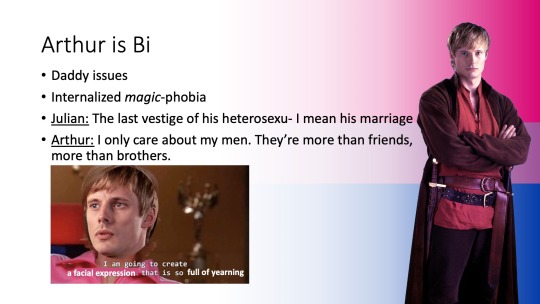
Do you remember when you were bullied in middle school? Because if you're reading this, I think it's fair to assume that you were. And your parents would say to you, 'that boy is just being mean to you because he likes you'. That's what this is.
Arthur is just so repressed. He has really bad daddy issues, and he doesn't know how to express his emotions, and he's really uncomfortable with physical intimacy, especially with other men, especially with Merlin. And this isn't me trying to psychoanalyse away his heterosexuality. It is a very evident part of his character.
And another big part of his character is that he has inherited all of these bigoted ideas about magic from his father that he has to work to overcome. Because, of course, Arthur himself is born of magic, but his dad is so ashamed of it that he hides the true circumstances of his birth from Arthur. Honestly, I don't know exactly how that would fit into this whole metaphor. I do have a half-formed theory that it could be interpreted as an allegory for intersex identity, I know that a lot of people headcanon Arthur as trans, so idk there could be something there. But regardless, it is only through his relationship with Merlin that he is able to overcome this magicphobia, because he realises: how could it be wrong when everything about Merlin is so right. And I just feel like there's a metaphor in there somewhere.
Of course, I have to mention this iconic quote from the audio commentary of the final episode: when the executive producer refers to Arthur taking off his royal seal to give back to Guinevere as passing over "the last vestige of his heterosexu- oh sorry, I mean his marriage." So, they knew exactly what they were doing.
I also thought I would just draw your attention to the fact that at one point Arthur says, "I only care about my men, they're more than friends, more than brothers." Now, I think we can all agree that out of context, that is a very gay thing to say, and yet somehow the context is even gayer, because Arthur is pretending to be talking about the Knights of the Round Table, but he's actually talking about Merlin, how Merlin is the only person he cares about, more than a friend. And then Merlin responds, "I understand. I wish I didn't, but I do." It's barely subtext at that point. This of course, brings me to my final argument:
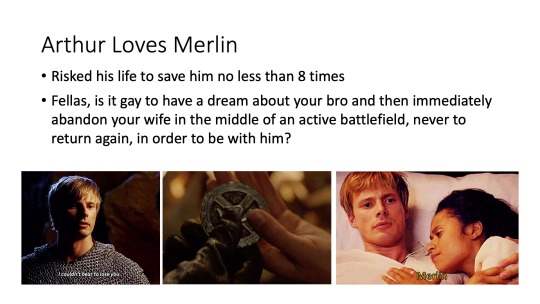
Arthur risked his life to save Merlin at least eight times. It could be more than that, I genuinely lost count. And you have to keep in mind that Arthur is the King of Camelot and he doesn't have any heirs. It is quite important that he stays alive. And yet anytime that Merlin is in the slightest bit of danger, he will just drop everything to protect him.
And it's really only in those moments where he's faced with the thought of losing Merlin that he shows him genuine emotion. Such as in this scene (which was cut out of 4x02 purely because it was too gay) where Arthur is planning to sacrifice himself to protect Merlin, again, and he gives Merlin his mother's sigil, the only thing he has left of his dead mum and he wants Merlin to have it as something to remember him by. Also, apparently in medieval times giving someone your family crest was basically a marriage proposal, so that's pretty gay.
You know what else is pretty gay? Telepathically communicating with Merlin and then immediately leaving Gwen in the middle of an active war. This is literally the last time that Arthur and Gwen ever see each other. Poor Gwen.
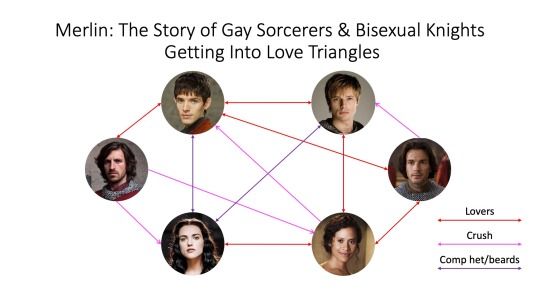
In conclusion, Merlin is the story of gay sorcerers and bisexual knights getting into love triangles. Everyone in this show is queer and you cannot tell me otherwise.
#because I realise this is the first post you'll see on the dash: this is all taken directly from a tiktok I made over a year ago#my thoughts on this point especially have developed a bit since then. and this is written for a more entry-level tiktok audience#so it's very lukewarm takes to my fellow soldiers in the trenches#but I'm not expecting this to get much notice and idc/idk how to articulate my thoughts better so just take it for what it is#arthur pendragon#merthur#bbc merlin#merlin#merlin meta#the magic of metaphor
128 notes
·
View notes
Text
I'll likely make a more in depth post once I've read through all the translated light novels but
Hello Apothecary Diaries fans I am in volume 8 and would like to reassure you about the choking scene from volume 5
Spoilers under the cut!
Okay so there's a scene at the end of volume 5 (the manga is not there yet) that many have interpreted as sexual assault. For the sake of those sensitive to such topics, I'm going to give a light on spoilers version of the scene and then an in depth analysis. Personally, I do not view the scene as sexual assault, but it is very forceful and carries A LOT of very sad subtext. You'll understand what I'm getting at in the more depth part.
So, the general gist of the choking scene.
MaoMao and Jinshi are in the garden to escape a banquet. They talk for a bit about a very scary incident that occurred that day (thankfully nobody was killed) and share casual conversation. Then Jinshi brings up that they're at this banquet to find him a wife. I won't spoil the specifics, but fyi MaoMao has been wearing an accessory this whole time that loudly announces (to everyone except herself, of course) that She's The Favorite™. Despite how obvious Jinshi has been with his intentions, including holding her hand and combing his other fingers through her hair while mentioning the whole wife thing, MaoMao evades him while thinking "I'm not capable of love". So, she tries to dodge him by offering up another woman. This is what causes Jinshi to snap and choke her, as well as hold one of her arms behind her back to stop her from fighting back.
He doesn't kill her. As far as damage to her throat, the text doesn't indicate any. He then leans his weight on her. MaoMao then remembers how she was taught sex techniques against her will be the Verdigris House women & decides to use those techniques against Jinshi. She then promptly leaves and Jinshi feels like the most pathetic man in world.
The two don't interact beyond official matters until towards the end of volume 6. Jinshi brings more rare medicine in lieu of an apology. The two talk around the wife situation again and MaoMao gets tickled. It isn't until volume 7 that they have an actual conversation breakthrough.
That's my light on spoilers version of the events. Now I'll give a more in depth version, that's honestly a good chunk of my own meta-analysis around the events of volume 5.
Honestly, volume 5 is full of really interesting scenes regarding Jinshi and MaoMao. This is the first volume after Jinshi has been forced back into Imperial Brother status, yet the first thing I noticed that actually changed between JinMao is how MaoMao takes initiative with him now. As soon as she learns an insect plague might be on the horizon, she dives into unprompted research and delivers her findings to Jinshi. She's no longer working at the palace or for Jinshi, but she still takes on the extra burden. She also takes initiative to get Jinshi some extra sleep (though she misinterprets his desire to not sleep alone). And later in the novel, when they're in the paper makers' village, MaoMao acts so cute when reapplying Jinshi's burn scar makeup. I'll let screenshots talk for me.

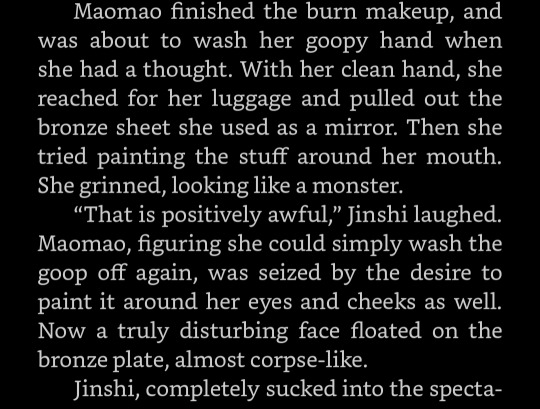

Like man. She's so cute. And I wonder, if these two didn't have to deal with social standing and imperial drama, would we get way more of them just being cute and companionable? If MaoMao wasn't an unwitting member of the Who Wants To Be An Imperial Princess race, would her feelings for Jinshi have grown without so much pushing and urgency on his end?
But I digress. I think a lot of volume 5, especially once they reach their travel destination, is MaoMao trying her best to keep her blinders on even though she is in the thick of imperial drama. She's especially desperate with regards to the blazingly obvious fact that a certain someone of very high status is in love with her. I think the end of chapter 6 does a very good job of driving home one of the major reasons why MaoMao is reluctant to trust Jinshi's feelings.

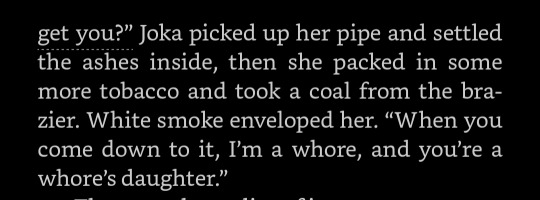
To add fuel onto this unfortunate fire is that MaoMao, as an unmarried courtesan's daughter, was attacked as an infant by her mother, sought after by fucking Lakan of all people, ignored while crying as a baby, and forcibly taught sex (to the point of tears!). She also had to cover for Luomen's own eccentricities, specifically ensuring they had enough money to feed themselves. MaoMao, to put it shortly, has been taught not to believe she can attain anything beyond her very simple life of being a lowly apothecary.
And then here's Jinshi who, as a prince, has been forced to grow up fast & have all his favorite things taken away from him. I think MaoMao is the first time he ever wanted a person. He is, for lack of a better word, obsessed with her. I think a lot of his pushiness & tendency to be clingy with her is him desperately trying to make sure he doesn't lose her. If he makes her his wife, then, well, she can't leave.
And I think the choking scene is him finally at his breaking point. At this point, he has lavished her with gifts, been very forward sexually with her twice, and given her a new hairpin that is essentially this story's version of a promise ring. It's MaoMao's repression/reluctance vs. Jinshi's desperation and so far she's winning.
But then she pushes him past his breaking point and he takes physical action against her. MaoMao responds by performing an unspecified sexual act on him.
So why don't I personally take this scene as sexual assault?
Mainly because I think the people actually guilty of sexual assault her are the Verdigris House women who forced MaoMao to learn sex.
As far as I understand it, whether MaoMao can actually say no to Jinshi is left up to interpretation. If we're talking on social status terms, she can't say no. But if you look at Jinshi's overall treatment of her, both before and after this scene, I very much think MaoMao can say no and instead chooses to defuse the situation.
Because what isn't for interpretation, however, is MaoMao's abysmal impression of what love and sex can actually be for her. So she defuses a situation by using sex, something she herself doesn't like, and doesn't allow Jinshi to reciprocate, which leaves him feeling terrible, too.
I want to be clear. I do think Jinshi is in the wrong for physically attacking MaoMao. But the sexual portion of the scene, at least to me, falls squarely on the shoulders of MaoMao's fucked up backstory.
Anyway, I think I've typed for long enough. I am using the official translations of the light novel for this analysis, so if any fans have access to alternate translations or WN only knowledge that throw my analysis in the trash bin, please let me know (fyi puedo leer el español).
#analysis#the apothecary diaries#kusuriya no hitorigoto#maomao#Jinshi#jinmao#not a headcaon#well there's a smidge of headcanon#anyway it's 8 in the morning on a Saturday and I'm going crazy over jinmao how are you doing#oh also jinshi gets sentenced to yaoi fanservice in the opening scene of volume 6 it's great
177 notes
·
View notes
Text
How Izzy’s Death Could’ve Made Basic Storytelling Sense
Just to be clear, Izzy is my favorite and I wanted him to live more than anything. This isn’t about that, and that is NOT why I hated his death. Had it served the narrative in a way that made even the most basic storytelling sense, while I’d admittedly have been devastated in a different way (i.e. the character whose queerness was relegated to the subtext in s1 and as soon as it’s textual and his whole arc is that he’s killed, but that’s a whole separate post…), but at least there would’ve been a correctly crafted arc from a surface level narrative standpoint that ended in the death of my favorite character. But that’s not what this is about. It’s is about how the show could’ve actually made the death actually make sense and work effectively. (Also, if you want my unasked for thoughts on how most of the existing plot of s2 (minus 7-8) could’ve easily been adjusted to fix the narrative as a whole and keep Izzy alive, I wrote this)
But. For those in the fandom insisting that Izzy HAD to die, including DJenks who has said as such in interviews (for reasons I do not understand), from an objective developmental editor standpoint, this is what I think needed to change to make Izzy’s death serve the narrative, character arcs and dynamics, pacing, structure, and thematic elements correctly.
It’s about 2K words just so you know what you’re gonna get into. Spoilers under the cut.
Issue 1. Izzy’s relationship with the crew and how they truly became his family this season totally vanished during his death scene. The same crew who he protected from Ed during the later, worse parts of the Kraken phase. The crew who banded together to save his life by hiding him from/lying to Ed about it, and amputating his leg to save him. The crew he saved by crawling up those stairs during the storm, hobbling out into the rain with one leg and shooting Ed before he could shoot a cannon ball through the mast and kill them all. The crew who called him “our dick”. The crew that then banded together with Stede’s half of the crew to him the leg and the new unicorn (aka the figurehead of the ship). That crew didn’t cry a SINGLE tear when he died. What?? Fang sobbed most of episode one and really lost it when Izzy got shot. Where was that when he died?? Izzy’s last speech to Ricky had something along the lines of: piracy is about belonging/family. We are Good. (Forgive me, I’m paraphrasing, but that’s the gist). Izzy truly did find his family in the crew outside of Ed. That was absolutely fantastic, especially in the first four episodes and episode six. It VANISHED when he was dying and dead.
The fix: To make the death impactful, effective, or even to make it make sense on a very basic acting and writing level, the crew should’ve been utterly DEVASTATED. At least heartbreaking music and like 30 seconds of everyone breaking down and holding each other. At least some of them crying and holding each other in the background when he was dying. Come on.
Issue 2. Thematically speaking, is piracy Good or Bad? Again, Izzy tells Ricky that they (the pirates/his crew) are capital G Good. Yet Ed has spent a lot of time maintaining piracy is capital B Bad. He tells the urchins as such. Here’s some money that I never had, now you don’t have to be pirates. Don’t be pirates. He doesn’t want Stede to kill Ned Low in cold blood. Ed just doesn’t want to be a pirate. Even at the end AFTER Izzy dies telling Ed he’s with his family (implied that this is the crew) and they love Ed, Ed LEAVES THAT FAMILY AND LEAVES PIRACY IMMEDIATELY. We’re left with him and Stede watching the family Izzy swore was Good and loved Ed sail away because Ed thinks piracy is Bad. Which is it?? The death served nothing in convincing Ed he could be happy with his found family on the sea as Ed, not Blackbeard, so the dying words were pointless. The thematic elements are all over the place (for the whole season but that’s another post) and that needs changing to make the death scene make sense.
The fix: Izzy should’ve told him he sees he doesn’t want to pirate anymore, he’s glad he’s found love with Stede because Izzy isn’t going to make it, go run your fokkin’ inn, you twat (affectionate).
Issue 3. Izzy died of bad planning and bad luck. Why didn’t they take the gun from Ricky? Between Spanish Jackie, Izzy, and Jim, SOMEONE would’ve thought about it. If not those three, someone else would’ve, but come one. One if not all of those three would’ve known better. Yeah, Izzy happened to be standing in front of Ed and he got shot instead of him, but you’ve gotta be REALLY looking for that to even be aware it’s what happened. It wasn’t even on purpose unless Ed strategically placed himself behind Izzy (which I doubt was the intent). Izzy didn’t position himself protectively/take the bullet for anyone on purpose. It was just happenstance and you only notice it if you’re rewatching and hyper-analyzing everything (which a lot of us, me included, in the fandom do, but casual watchers don’t. It’s totally unclear as far as the surface level narrative goes) Any sort of “heroism” is not acknowledged, it’s barely even noticeable in the shot. If that was the intent, it HAD to be clearer and acknowledged by the characters so the audience would realize the stakes and repercussions of clear choices. As it is, I don’t think it was intentional. If Izzy HAS to die, it should truly have rounded out his arc in a way that CLEARLY changed the course of the scene, leaving him to protect people he’d put in danger at the end of s1. It didn’t. It just read as terrible planning to the point of it being out of character for more than one character, and bad luck.
The fix: Izzy should’ve saved someone. I personally don’t like the idea of it being Ed. I’s have rather he save Stede (Not really, but it’s better than Ed I guess) But really Izzy should’ve died saving the crew. The crew makes the most sense to me, narratively speaking. He’s their figurehead, he’s protected the Kraken Crew for months and they should’ve been fiercely loyal to him, he blames himself for what Ed did to them (more on this later) so it makes sense for him to fiercely protect his crew. His family. Who should’ve been devastated that it happened because Izzy is the one character of the main three who’s managed to earn that status this season.
Issue 4. The death did not serve to move the plot along. There are literally zero things that would’ve been different for the end of the episode, save Izzy being alive and on the Revenge in his rightful role he earned with his crew as the captain, if he’d have lived. Ed and Stede aren’t partnering with Zheng to go after the guy who killed him in the next season. Nope. They got the offer but nah. They’re running an Inn. Which Izzy would’ve supported based on literally everything we’ve seen from him in episodes 5-8. The crew who Izzy protected fiercely and who viewed him as their leader? Not one tear during his death or the the funeral. Happily sailing away to do presumably more Muppet Treasure Island hijinks. No character development happened. No plot development happened. The season could’ve ended literally the EXACT SAME WAY with Izzy alive aboard the Revenge!!! No stakes were changed at all. No one was impacted enough for it to seem like it was even going to be a plot obstacle next season. It just happened, Izzy’s toxic situationship who maimed him multiple times over the course of months to the point of his leg needing to be amputated was sad for one (1) scene, then we moved on and did not seem sad at all at the funeral. What.
The fix: The plot should’ve been driven by the death. Ed and Stede (but especially Ed), and DEFINITELY the crew should’ve been sailing off plotting to avenge the death and defend piracy against Ricky and the British, especially with Zheng who lost her whole fleet. Ricky and the British are clearly (or so I hope, nothing’s clear here anymore tbh) the primary antagonist for the theoretical third season. No one should be running an whim-based inn for fun or sailing off happily into the sunset after the death of the most major character aside from Ed and Stede, who beyond proved himself a major part of something every character (his family) should’ve cared about this season. If he HAD to die, that death should have furthered the plot. But instead, it seems everyone shrugged it off with tears exclusively from Ed.
Issue 5. Izzy got shot in the left side. The side in which canonically NO ONE DOES FROM BEING INJURED ON IN THE OFMD UNIVERSE.
The fix: Yeah I know this is just too nit-picky but it was also just SO sloppy. Like just shoot him on the other side if he has to die, because this was a very memorable plot point more than once in s1. Like, come on y’all.
Disclaimer: Issues/fixes 1-5 would all need to happen together to truly fix it and make the death serve the narrative correctly. Issue/fix 6 is a totally separate route, which I personally hate, but at least the narrative would’ve made sense this way.
Issue 6. The idea that Izzy had to die so that Ed could be free of Blackbeard makes no sense at this point in the story. Ed already threw away his leathers and gave away his treasure to symbolically get rid of Blackbeard, and Izzy very sweetly encouraged him to follow the feeling that throwing out the leathers gave him. Izzy told Stede that he and Ed were good for each other. They balance each other out. Izzy is on good terms with both of them and their relationship, so Izzy “having to die” so Ed could flourish as Ed genuinely makes no sense and came totally out of left field.
The fix for 6: This one stands alone and is my absolute least favorite option, but if it HAD to happen without the 1-5 fixes, here’s how it could’ve made sense. If THIS is truly the way it was going to end, Izzy needed to be continuously antagonistic or avoidant to at least Ed and actually be shown holding Ed back from happiness until that last second. He wasn’t. He was so much better. Izzy clearly does blame himself (that’s for a separate post because I have lots of thoughts there) but to be fair they were both abusive in that relationship, for years it seems. Although I think by the beginning of s2, the power dynamic has clearly flipped and it was Ed who was doing most of it and Izzy was exhausted and knowingly “reaping what he’d sewed” (I don’t Blame Izzy for his abuse but I think this was his mindset) so the crew wouldn’t get the brunt of it.
If he seriously HAD to die because the writers just had to have it that way, those are the changes I think would’ve made the narrative work/make sense, served all the character arcs and dynamics correctly, and actually driven the plot as fictional deaths are supposed to, compelling things into a third season. Seriously, this season finale was a mess of baffling choices the most series finale season finale I’ve ever seen.
Anyway. There’s my unsolicited two-cents. Now back to hoping Izzy’s in the gravy basket waiting to be sea witch necromancied back by seagull Buttons in season 3. I love this show and I hate hating what I hate hating about it because it’s my absolute favorite and I can’t stand it because it’s fantastic and the worst thing I’ve ever seen. (Also, Izzy should’ve lived).
#ofmd spoilers#izzy hands#ofmd#ofmd season 2#ofmd season 2 spoilers#ofmd meta#izzy my beloved#izzy deserved better#we deserved better#eyyyy djenks if you need a dev editor for s3 just hmu#david jenkins#ed teach#stede fucking bonnet#stede bonnet
179 notes
·
View notes
Note
Is there really a married couple dynamic between Killua and Gon? If so, any examples of similarities to other couples in the anime?
The director of the 2011 anime thinks so!
I agree with what he said, although of course there's a limited degree to which this comparison applies because we are talking about two young boys (who aren't even in an actual romantic relationship yet), after all. :p The ways they resemble a married couple in my opinion include, but are certainly not limited to:
Extreme trust between and reliance on one another
Being synchronized in their actions and thoughts in many cases (as if they've been together a long time)
They have a good understanding of each other and insight into how the other thinks
They bicker over silly things, but quickly go back to getting along after disputes
They essentially lived together in the around two years they were together. They were with each other almost constantly during that time, and there's a degree of domesticity and closeness/comfort to their relationship as a result
They talk to each other almost non-stop, to a point where we see them chattering away in the background frequently
They work together towards common goals by default and generally only compete for fun
To quote Hiroshi Koujina (from the post linked above), "Gon is the free-spirited husband, and Killua is the wife who silently supports him" <- I think this is a good summary of their dynamic within this context, LOL
It's hard to compare them to many couples in the series because honestly, HxH doesn't have many actual romantic couples to begin with. Togashi tends to kill one half or more of the romantic couples he sets up, often before they get to have a good life together. Think Squala and Eliza, Pokkle and Ponzu...
However, Meruem and Komugi are parallels to Gon and Killua, and that's essentially undeniable with how many layers of parallel/similarity exist between the two pairs. That's a topic for a whole other post (I could go on and on, and it's hard to summarize), but the way Meruem and Komugi's relationship develops is also telling of Gon and Killua's dynamic because the two are intended to exist in comparison with each other and reflect each other.
One of Komugi's final lines to Meruem was essentially an old-fashioned way to accept a marriage proposal ("I may not be much, but please, let me accompany you"), and Meruem and Komugi complete a lover's suicide (like Killua was considering doing with Gon). Obviously these character pairs are separate, and it's not as though I think Gon and Killua will suffer the same fate, but I do think it's very meaningful (especially in conjunction with the loads of other subtext present in the series) that Togashi chose another pair with obvious romantic subtext to mirror Gon and Killua, and that that relationship ended with "marriage" in an abstract sense.
Even Komugi's phrase I mentioned above has similarities with Gon and Killua, with Killua's, "Gon. You are light. Sometimes you shine so brightly, I must look away. But even so, is it still okay if I stay at your side?" It's essentially saying the same thing as Komugi's phrase.
I'd argue there's also some degree of parallels with Ging and Kite, Knuckle and Shoot, Kacho and Fugetsu, Kurapika and Pairo, and most likely others, though of course those aren't romantic in nature. I do think the fact that there are so many points of comparison is interesting, though, it reinforces the themes of the series that Gon and Killua exemplify.
Also, just a silly little sidenote, but Nagareboshi Kirari from the 2011 anime does have wedding bells in it. Take that as you will!
I hope that's helpful!
74 notes
·
View notes
Text
on karamelle, why it sucks, and redeeming azteca's reputation.
I just got to Karamelle for the second time, and good lord. I hadn't forgotten how much I hated it, but it hit me like a wall of bricks. And I'm already preparing myself to marathon it and be fucking done questing here for at least a year.
I think it breaks down like this.
Baby's first workers rights movement/sugary-sweet surveillance state
Listen. I know this is a game that doesn't allow for player characters to have much individual impact on the in-game narrative. I know we've had to do errands for cops. I know we work for a war criminal. I KNOW there are flaws in the system. But there's something about the way that Karamelle's set up that makes it all feel so. much. worse.
And that's the fact that Karamelle has such a stellar reputation within the Spiral before this. The happiest place in the Spiral, the sweetest treats in the Spiral. Everyone seems to fucking love this place. Almost no one outside of those actually working there seem to understand how corrupt it is. And so the YW is talked down to at every turn, like this is their first exposure to a corrupt environment. And sure, maybe it is within, canon. YW gets isekai'd at a very young age and then made into a child soldier, maybe this is actually the first time in canon that they've been introduced to these concepts. But (and this may just be me) it feels really rude to the player -- who might actually have experience with these ideas -- to make them feel like a fucking idiot with the dialogue options. Karamelle's characters just feel rude.
Oh, so the Gobblers were a fatphobic, Roald Dahl type thing from the start. Cool cool cool.
Any of you ever read Roald Dahl's book "The Twits"? It's a very unremarkable story all things considered, except for this bit.
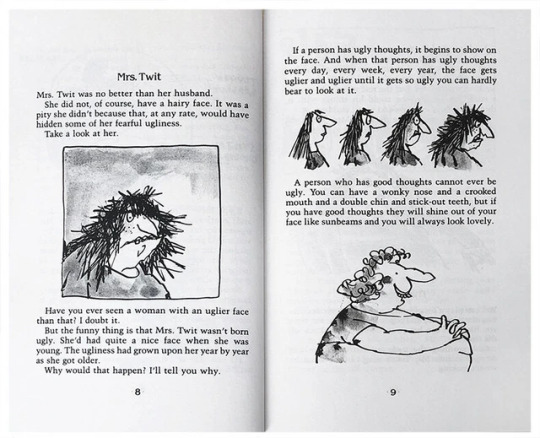
Aside from Roald Dahl's unavoidable history of antisemitism, does this remind you of anything? Honestly, this reminds me of the Gobbblers.
We first meet the Gobblers around level 10 in Wizard City -- creatures driven by consumption. And then we get to Empyrea and hear that the Alphoi -- skinny "civilized" creatures -- can become Gobblers if they eat too much or are unhealthy in their eating habits. Which makes one of our oldest running enemies a loop-around fatphobic thing, ESPECIALLY when we get to them in Karamelle, the home world of the Gobblers. Rosina, especially, just oozes fatphobia and diet culture. The literal vilification of being fat isn't even subtext, it's just text.
The Old One, The Cabal, and what to do when your escape from the world ends up shoving what you were escaping from right back in your face.
When I was in sophomore year of college, fall of 2019, I had one of the worst mental health periods of my life. Antisemitism was fucking everywhere, I was always a moment away from a panic attack, and it felt like no one understood. While I'm lucky in the fact that I was able to get an official diagnosis for genetically inherited PTSD, alongside the reassurance that I wasn't fucking crazy, there was a period when I just needed to go home for a moment. So when I was going back to my dorm from the dining hall to make sure all my stuff was ready to go, I opened up tumblr and made a post on a long-gone RP sideblog I had for the Swedish Chef (y'know, from The Muppets? long story), and before I'd even gotten halfway across campus, I'd received threatening and violent messages from someone RPing as Borat, which only got worse when they realized they were talking to an actual Jewish person.
That escape from reality didn't even last five fucking minutes before the horrors I was trying to avoid found me.
Now, Wizard101 has always been a source of comfort for me. I made my account fourteen years ago, and I do not know what my life would look like if I hadn't done that. There are flaws with this game, yes, sure, but over the past five years (since I got a wiz compatible laptop) I've developed a bit of a reliance on it to get me through the horrors. No better form of escapism.
But no art form is free of the horrors.
And Wizard101 has the fucking Cabal and Old One.
The Cabal within the fiction of Wizard101 is a secret, nefarious organization pulling the strings on events across the Spiral, controlling history from the shadows. This term literally originates in antisemitic conspiracy theory, with the term 'cabal' originating from the term for Jewish mysticism, 'kabbalah'. And I promise you, you've heard plenty of applications of this conspiracy theory in real life too. It feeds into the idea that Jews (or 'global elite') control the government, the media, the banks.
And then, we get to the man in control of it all. The Old One. Whether or not this was intended, he's a walking, talking antisemitic caricature. The octopus as a symbol for the mythical Elders of Zion is a longstanding dogwhistle (see attached for a guide to this and many other visual dogwhistles). "Oh, he's based on H.P. Lovecraft-" So he's based on the works of a famous racist and antisemite, cool cool cool.
It's just exhausting, walking through a world that is so clearly modeled after Germany and other parts of eastern Europe, and finding antisemitism around every corner. And even more exhausting considering it's almost impossible to tell if they meant to do it. Antisemitism is so fucking ingrained in the world at this point that I don't actually know what they meant to do here, what they did maliciously or out of ignorance, or if any of it was put in with the purpose of turning it on its head. Over the past few years, it has become glaringly obvious that a lot of people don't realize when they're running across antisemitism, or even taking part in it. Including people I really thought would know better.
Side note.
For those of you who know I see Dasein as Jewish, you may be wondering how I balance that out with the antisemitic nature of The Old One, since they share a physical form. I think of it like this. Dasein did not choose The Old One. He did not choose to resemble that, but he can attempt to reclaim it. Dasein's Judaism comes not from the resemblance he holds to the hatred that haunts us, but from the love that keeps us going. He questions authority and longstanding tradition, chooses to do what's right instead of what's expected, and is kind in the face of hatred. He literally makes himself, and a world, out of nothingness. Something out of Nothing. He's so Jewish you guys.
The Spiral's "Worst World Award" goes to...
I know we all say "fuck Azteca" pretty often on this website, but I don't think it deserves to be deigned the worst world in Wiz. My main gripe with Azteca is how inaccessible it gets after Xibalba strikes -- the flashing lights aren't exactly photosensitive friendly. Which further lends frustration to my completionist nature, meaning I have to finish all quests, badges, and fishing before I finish the world (making it take forever to finish). Aside from that, there really isn't that much wrong with the world (and if you argue that it sucks because you can't save Azteca, I get it, but some tragedies are inescapable by their very nature). It's a problem of gameplay, versus a problem of plot in the case of Karamelle. And maybe its just because I'm a writer, but problems with plot feel much more egregious. I really do think Karamelle deserves more vitriol than it gets.
G-d, I can't wait to get to Lemuria.
#behold. the long awaited kvetch.#wizblr#w101#wizzy101#wiz101#wizard101#y'all better check out the resources i've linked :gun:#there really is something to be said about fantasy worlds where Judaism does not textually exist but antisemitism DOES.#like hmm. where did that come from. anyways.
98 notes
·
View notes
Note
If the gayness can be denied it can just as easily be called queerbaiting. Text (and subtext) is less impactful and meaningful than action, even in the right direction. I think if gay people say it's not good enough isn't that an indication that it isn't good enough or enough for them to feel represented?
No.
There’s been a concept in social media activism that the primary perceived value of queer content in media is how loudly it demonstrates inclusion of a particular identity, and a lot of popular media gets judged solely on this aspect, like it’s checking off a tickbox for binary approval.
A kiss has been chosen by many of these circles to be the most concrete binary proof you can have for a character’s queer sexuality, but putting aside the fact that many identities don’t benefit from that at all; (theoretically a bi person would have to kiss 2 different genders to ‘prove’ themselves this way, why would a trans person kissing anyone prove anything, asexual or aromantic obviously inapplicable, etc) w
It’s simply incorrect that text is less impactful than “action”, given that media is Text. The Text is what comprises its “action” and what it’s statement of intent is. A kiss is not action, a kiss is Text. A gay character that does kiss or meets whatever satisfaction the audience deems for “representation” is still a creation of Text as much as a gay character that never kisses anyone. There’s no separation there. This wholesale disregard of theme and meaning of text and subtext in fiction and instead only approving media-friendly headline screenshots is one of the greatest tragedies of modern popular culture.
Treating the ‘undeniable’ existence of a queer character as “action” and “representation’ and not examining the actual context of their inclusion and what the story says about their identity, their lives, and their experiences is how you get Disney’s First Gay Character popping up in the news twice a year- it’s become more important for the headlines to State that you have one than for them to actually be important or meaningfully written, or for the story to have anything to say about the character or their lives.
At this point of popular social media understanding, Queerbaiting simply does not mean what people have begun to use it to describe. Queerbaiting was intended to refers to deliberate marketing attempts to accrue viewership by over-promising the presence or importance of queer content to Bait in queer viewers hoping to be included. The key part of Queerbaiting is the intentional misdirection here, and because of that there is a very important distinction between queer subtext that is created to build intentional undertones and that which is included specifically to tease and entice viewers with the promise of more.
Many anime shows that people accuse of queerbaiting are doing exactly the opposite; in the case of Flip Flappers the overwhelming Text of the story is largely and centrally focused on the burgeoning sexuality of a young girl as she grows up and realizes that what her heart desires may conflict with expectations set by herself, her family, and society at large. That remains true through to the end of the story where she makes a breakthrough in her understanding of herself and her place in life and her sexuality is a major part of that.
A kiss is not at all required for this, but because there isn’t one people somehow become convinced that the story is “baiting” them desptie the actual meat of the story itself being fundamentally about being queer.
Now, there’s definitely room for subjective differences in appreciation here, especially taking more Yuri works as a whole (particular Slice of Life), in which many of them do place their queer undertones as a less central tenet that aren’t deeply explored. I’m not saying that you as an individual can’t feel that you’re not satisfied without a more substantial story; but it doesn’t mean these stories have Failed in their role of Representation; they still have value and purpose whether they meet that shallow criteria or not. And it doesn’t mean that they aren’t Real and these characters aren’t quite obviously gay to anyone paying even the slightest attention.
What I’m actually hearing most of the time is that people consider the capital r Representation buzzword to tick off a box of “HAS LESBIAN” to be more important to them than actually reading a Story about gay people that has something meaningful to say; Add further to this deeper disqualifying factors restricting death, tragedy, “unhealthy” relationships, etc. And you quickly begin to cut down the number of stories you accept to only those which portray a superficial, consumer-friendly veneer of queerness.
This is in itself a sanitization of Queer identity that doesn’t celebrate or represent anyone; it’s selling an idea of Queerness that is clean, palatable, easily accessed.
That’s simply not enough to satisfy me, and it shouldn’t be for you either.
2K notes
·
View notes
Text
Todoroki: The Mountain, the Hawk, and the Haunted House Part 1
Link to the Todoroki family presentation: Part 1 | Part 2
Link to the Bakugo presentation 2.0: Part 1 | Part 2 | 1.0: Part 1 | Part 2
Link to the Kirishima presentation 1.0 | 2.0
Link to the Todoroki presentation
Link to the Deku presentation
Link to the Uraraka-Bakugo-Toga presentation
Link to the Shigaraki-All for One presentation
Link to the Spinner-Shigaraki-Bakugo-Deku presentation
Link to the BNHA presentations masterpost
In the online fandom system, domestic abuse offenses are considered especially heinous. In the My Hero Academia fandom, the dedicated fans who create the discourse around these fictitious felonies are members of an elite squad known as the So (you think these) Victims (are the most special characters) Unit, or SVU.
These aren’t their stories.
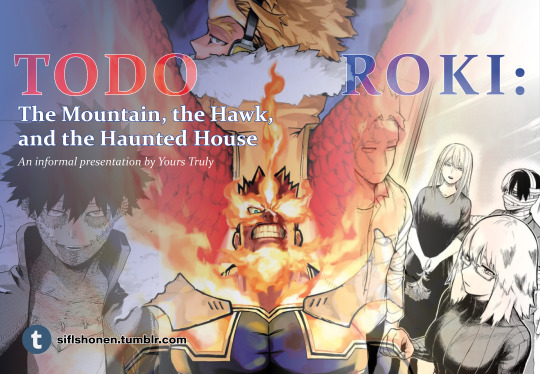
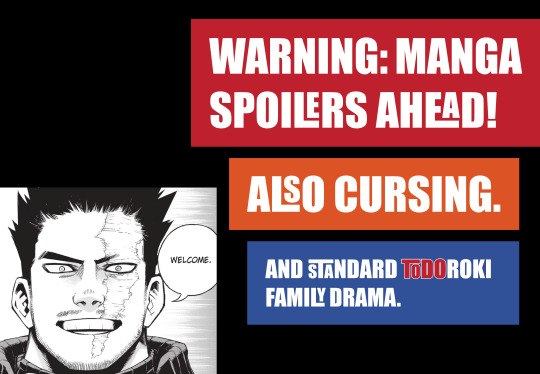
Whenever a work from one culture or language is brought to another (or even if the work stays in the same culture but transitions from page to screen), the translators, localizers, and creative team handling it can only do so much to help the new audience understand what the original work communicates through subtext or cultural associations by deciding how much of the work to leave out or change. In other words, the team must choose how to fail.
In the case of the Todoroki family, I feel there is much lost in translation. Or, at least, there is much lost if the reader doesn’t share the work’s original cultural background. I’m going to try to make my point with a poem.
Four children are mine
And I love my four children:
An arrow to ward away the darkness
aimed for the light of the dawn;
The winter, who brings the night again, beautiful and longer;
Next the summer,
who returns the sun at its zenith;
And small is the leader with clear sky and dusk rain in his eyes.
Four children are mine
And with four comes death
The arrow flies too high from the bow
The arrow flies but falls to darkness
From a shrine in the mountain, he aims for me.
My son haunts the mountain near the peak
I fear the mountain I cannot climb
I fear the arrow meant for me.
Winter settles quietly
Summer turns away from me
The leader makes a mirror of my heart
I tell my son I love him
And I look in the mirror yet I cannot face it but to watch it crack
My son is my spitting image
I tell my son I love him
I tell my son
Without looking into his eyes,
I tell my son I love him
As the arrow flies.
This poem is about Enji Todoroki and his children - the four he actually fathered and the one for whom he unknowingly acted as a surrogate. The poem vaguely alludes to the meanings of the children’s names with one notable change - for Shoto Todoroki, instead of calling him “charred frozen” - which is basically how his first name is written - I called him “leader”.
When written with different characters in Japanese, “Sho” can mean “leader.” So, while “leader” isn’t the true meaning of Shoto’s name, I decided that it was thematically fitting to use since he’s also the “hero of his family” and leads the way for them to continue into the future. In changing the meaning of Shoto’s name, I chose how to fail. Yes, it’s imperfect, but by putting in the work, I can at least show you how I arrived at the destination to help you better understand what you are reading. Much of what I’m about to write about falls into this category - it’s not exactly the perfect explanation or whole, unaltered, canon truth, but is supplementary information to help you come to your own conclusions.
Anyway, now that I’ve told you the poem is about Enji and his children, it probably comes off a little differently, huh? That’s the power of writing allegories and using recurring motifs. If you have not figured it out already, you’ll learn soon enough what words symbolize each child.
Now, let’s break down this already broken family. There are so many damn Todorokis that I’m going to do something very, very rude and call them each by their first name for the sake of clarity (and also because, frankly, it’s a more honest representation of how I actually feel about these characters.)
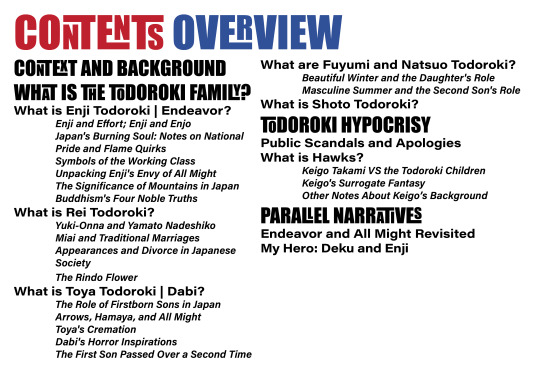

What is the Todoroki Family?
The challenges facing the Todoroki family - such as the pressures Enji feels, the disappointment and internal crisis Toya inherits, the social and marital prison in which Rei finds herself trapped, the nature of the public’s feelings of betrayal at the reveal of Enji’s family dysfunction, the social snafus and ugly family dynamics in which Natsuo and Fuyumi are often caught - are distinctly shaped by the series’ Japanese society. There’s a special je ne sais quoi quality to their family drama that feels authentic even to me, and I’m a foreigner to these cultural tropes. It’s a little disturbing.
But, besides a fictional family, what are the Todorokis? What purpose do they serve in the story? What is their purpose within the narrative, and what is the purpose of the narrative in which they exist?
Well, on the one hand, the Todoroki household can function as an allegory for traditional Japanese families, society, and power structures (we could use the word “patriarchy”) crumbling under the pressures of modernity and a changing world, which is similar to how the Shimura household functions in Shigaraki’s backstory, or even the story of All Might’s retirement. On the other hand, they are a case study of a deeply flawed family that, if the magic-powers quirk element was not present, could exist in the real world.
They make for good drama. But every member of the household serves a purpose in the narrative, in the family, and in the meta. Usually, these three things work together for a greater purpose.
What is Enji Todoroki?

I didn’t say, “Who is Enji Todoroki?”. I said, “What is Enji Todoroki?”
If you said, “an asshole and shit father,” well, yeah, you’re sure on to something! But it’s not helpful to disengage with a major character in a work if you want to understand what the hell they’re doing in the narrative. I’m not telling anyone to like Enji, or any Todoroki, but I am asking that you entertain the concepts behind them with an open mind, if not an open heart.
What is Enji Todoroki? Much of this should be obvious in any language, but I’m still going to break it down.


The manga tells us pretty blatantly that he is a man from an older generation struggling to remain relevant in a new and changing world. He is ambitious, prideful, hardworking, hypocritical, and wholly dedicated to his job. He’s the patriarch in a household structure that is no longer relevant and coming apart at the seams. But most of all, Enji is afraid that nothing he does will ever be enough.
What is Enji Todoroki? Enji is someone who tries his hardest at anything he does even when it sends him to ruin.
Enji and Effort; Enji and Enjo
In my Bakugo and Deku presentations, I mention that the concept of talent as a fixed quality is predominantly accepted in the west while a common eastern perspective posits that talent is something developed over time. The distinctly Japanese Enji and his personal conflict over the existence of the “natural born”, western-coded All Might thrusts these implied concepts of talent from subtext (not that they were particularly hard to identify throughout the manga) into blatant text. And I’m not just talking about the moment where Enji thinks to himself, “I have always envied natural-born superheroes.”

The written characters for Enji’s given name means effort. The name also sounds like another word for “fuckin’ honkin’ bigass fire”, Enjo, but for our discussion, Enji means effort. Endeavor, his self-chosen hero name, also implies the application of effort.
Everything about this man is defined by his efforts, even when they are in vain. Everything.
He pours his effort into becoming Japan’s greatest Hero. He pours his efforts into escaping the fate of his father. He pours his efforts into making the most terrible domestic choices possible to try to be enough for his family. He pours his efforts into atoning for his transgressions against his family, and then again for those against society. And it is not enough. He knows it is not enough, it never will be enough. Not one thing he has ever done in his life has been enough for him, enough for his family, enough for society. It is never enough. This is his burden.
You don’t have to feel bad for him about it, mind you. I’m just telling you that it is, functionally, his core struggle.

Enji poured every bit of himself into looking away from his son Toya and into running away from him. It’s going to take every bit of effort within himself to stand his ground and face his son again, and even then, he is still going to need help. Perhaps that’s pathetic, but even Enji knew he was only going to be a professional Hero, never a superhero.
Enji is a man who believes, who is basically required to believe, who likely cannot continue to exist if he does not believe, that his value and justification for being is defined by his ability to pull himself up by his bootstraps, or to just keep struggling in the endeavor.
He pours his effort into everything he does and curses his own weaknesses. Even struggling takes effort.
Japan's Burning Soul: Notes on National Pride and Flame Quirks
In my Kirishima presentation, I talk extensively about kouha and their manly aesthetic as it applies to symbols of Japan. What the presentation doesn’t talk about are flame motifs.
In Japan, flames are seen as purifying. They are also seen as manly, and not just in the way Kirishima defines it. There’s several phrases in Japan that talk about stuff like “a burning soul” or even “Japan’s burning soul” or the “blazing spirit” of a Japanese youth. Well, I think these are just about as tacky as they sound but in the same kind of boyish, tacky-cool way most shonen anime can be.
I’m talking about the flame motif on festival jackets. I’m talking about every time Galo from Promare talks about his “flaming firefighter soul”. To some extent, I’m talking about the flames on the Hokage jacket in Naruto (Minato’s and Naruto’s jackets get the flames as a nod to their shared mentor Jiraiya, who is a whole-ass conversation about masculinity in culture, theater, and mythology in and of himself.) These examples are indicative of each of these characters’ pride in their masculinity and in their nationality. Enji’s flame quirk and his constant use of flames as a brand are no exception to this trend.
Some minor characters, and later Dabi, allude to the fact that flame-based quirks are somewhat common in MHA. I’m not completely certain if the prevalence of flame quirks is also meant to indicate that these quirk holders share the same sort of “flaming spirit”, background, national pride, or even miscellaneous political views, but somehow I get the feeling that it does.
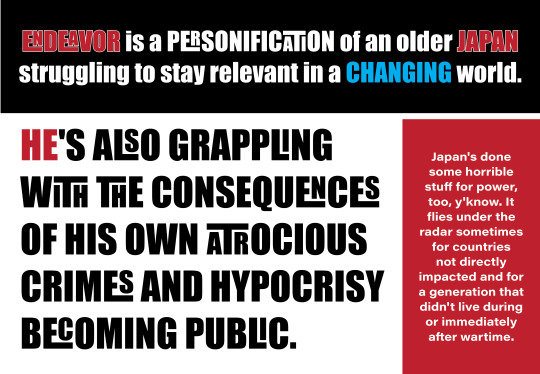
These people are, on some level, connected in that they possess the flaming soul of (masculine, old, patriarchal) Japan. The existence of Pro Hero Endeavor is a representation of the traditional, conservative Japan’s soul. All Might may wear red, white, and blue (and yellow like a yellow-haired westerner) to represent a certain set of foreign ideals, but Enji wears the red and the blue with distinctly Japanese pride.
The Colors of a Nation

Red and white, the colors of the Japanese flag, have strong cultural connotations through Japanese architecture, festivals, and shinto practices. (Please keep in mind that colors can mean a lot of things in every culture depending on context, and in Japan, different shades of the same colors can also hold distinct meanings. For example, certain shades of blue are often worn by villains in theater, but blue is not always “evil” or “villainous” by default.) But the color that I personally associate with Japan is blue - specifically, anything dyed with the aizome technique.
Aizome clothing, or clothing dyed with indigo, transitioned from being a nobility-only thing to one of the few colors that commoners could wear starting in the early 1600s - because by then, bright colors were exclusive to the nobility. The indigo dye is also popular for its antibacterial, insect repellent, and flame retardant properties. Firefighters wore it. Samurai wore it under their armor. So it’s not surprising to me that Endeavor’s Hero costume, and that of his son, would use fabric in a particular hue of dark blue.
Also? If you wanted to know? Aizome is used to dye Japanese blue jeans today. Hey, Best Jeanist!
Anyway, Enji is dressed in the color of the common Japanese man, the firefighter, the samurai, the noble laborer or honorable servant - but definitely not of high nobility.
We don’t know a ton about Enji’s background in detail, we know he wasn’t born ungodly rich. We know his father died. We know he went to UA. He made money from his Hero career, and married into a pedigree. Yes, he chose Rei because she had an ice quirk, but got the bonus of clout and old world connections.
So, uh, yes, the marriage of Enji and Rei was one of new money and big ambition married to old nobility and traditional values, and that’s true even when taking the kids out of the equation. But more on Rei and the marriage later.
Unpacking Enji's Envy of All Might
The majority of Japan’s political scene is conservative. (Look at the ideology column in that table, NOT just the name of the party. If you’re a westerner, I realize that identifying which ones are conservative is going to be particularly difficult to do given their translated names.) The Jiminto, or Liberal Democratic Party (again, look at the ideology column, NOT JUST THE NAME OF THE PARTY. Remember that “liberal” and “democratic” can hold different connotations in different countries!) was founded in 1955 and, despite having a nebulous identity beyond being “kinda to the right”, continues to hold a significant majority. Over the years, the party has commonly been seen as reliable, stable, and able to get the job done. Well, except for during those periods of time when the scandals came out.
This is not unlike how the public of MHA saw Endeavor. Well, until the scandals came out.
Now, I do not think it is correct to say that Enji = the Jiminto and leave it at that. (I would, however, call him a personification of Japan’s modern patriarchy, or at least something pretty damn close.) His dogged, openly vocalized grudge against All Might is more extreme than what the majority of the Jiminto might openly express, especially considering their consensus of policy regarding the US. I only want to give some context to the longer-standing political scene of Japan as it affects the modern day.
See, while Japan and the US have had an enduring relationship and are, uh, well, allies now, the older generations of Japan, particularly in rural areas, still hold deep grudges against the States and are bitterly, bitterly angry at the cultural imperialism and the military takeover and the government policy changes and the economic changes and the, well, the everything. Actually, the mutual cycle of envy between the Japanese and US citizens detailed in that Times article is important to remember from both perspectives. There’s old bias against each country lingering in both directions, and, while not a direct reference to how it remains in the Japanese population, understanding how it affected the creation of Japanese internment camps in the US is very illuminating in understanding the public US sentiment about the Japanese before WWII then after it.
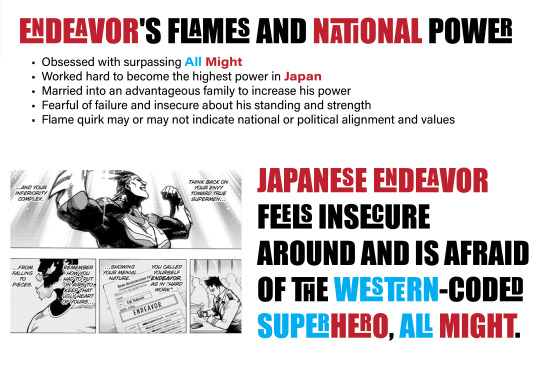
When Enji, (or Endeavor), discusses his inferiority complex, he gives away the game and makes the subtext of the rampant western envy present in many of the characters in the work burst out into just plain text.

While Toshinori Yagi is a Japanese man, the power he inherited, or what Enji (and the world) wrongly believed was “natural-born talent” (a western concept), blatantly signals “western power” through his costume and art style (US comics!) and he represents the “band-aid” of temporary western military and socio-political power imposed upon Japan.
The US is considered a superpower, after all.

That said, I do feel that giving the western-appearance clout (and magic quirk) to the Japanese Yagi aptly communicates that there is nothing naturally special about the US or its citizens, or really anyone who has power. All of that misunderstood “special glow” or “flawless perfection” or “incontestable strength” are just appearances, presentation, circumstances, and luck - nothing more and nothing less. Yagi (who is, again, Japanese, so this is a Japanese man displaying the incredible aptitude for superheroism, to Enji’s surprise and probable chagrin) may have had a knack for using the quirk and therefore was the greatest at winning and saving, but he also destroyed himself trying to be the perfectly westernized superhero.
Also, by comparing the obviously westernized Katsuki Bakugo and pridefully Japanese Enji Todoroki, Horikoshi makes his point that a shithead is a shithead regardless of nationality, background, or philosophy.
At the same time, both characters have the ability to change.
Speaking as someone from the US, I’m conflicted, humbled, creeped out, and very emotional over the fact that Horikoshi has chosen to have a complicated, sometimes critical (early Bakugo’s westernisms are not flattering, and the westernized persona of All Might is an unsustainable, unrealistic, unfair thing that destroyed the man maintaining it), but overall kind, laudable, and compassionate portrayal of characters that stand in for the west.
I’ve heard Horikoshi has been criticized as a “freeaboo” for the open admiration of the west inherent in My Hero Academia. I’ll admit, I think he might be a little bit of one, but I’d be the cat calling the monkey a long-tailed bastard if I didn’t also admit that I’m a bit of a weeaboo. We can be mutually embarrassed about how much we like each other despite everything, I guess.
But back to Enji and Yagi. Enji bitching about All Might and expressing disgust over his “American” presentation and perceived advantage is, um. Well, I could call it an example of him making excuses because Yagi is actually Japanese, but it is true Yagi gained experiences and some training advantages in the US that Enji did not have. And, like, Yagi also got a magic quirk (from another Japanese person.) That’s something.


But I digress. The irony and realities of Enji’s envy and self-deprecation could be debated all day, but it doesn’t lessen the stink of hostility and western envy wafting off of it.
The Significance of Mountains in Japan
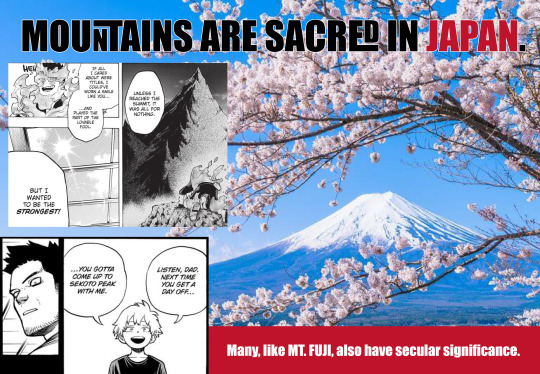
You know about Fuji-san, or Mt. Fuji, the largest and most iconic mountain of Japan? Awesome, because it’s Japan’s most famous cultural site and a great case study for how the Japanese view mountains as sacred. People hike Mt. Fuji and other sacred mountains for secular reasons, too, sure, but many do so as a spiritual pilgrimage. It’s a mixed bag, sort of like how, in the west, everyone is impacted by and understands Christmas despite how it’s primarily only modern Christians that have religious traditions regarding it.
Sekoto Peak, the in-story location where Enji sometimes trains and Toya burns himself, doesn’t actually exist and therefore has no real-life associated myths, but Enji’s choice to train on it indicates much about his discipline. It also provides a quiet association between honing his abilities to their pinnacle and his connecting to the understood sacred power of the mountain. There’s a mystical element to it.
Most, if not all, Japanese mountains are considered sacred in some sense no matter how tall or pretty they are. This is just understood. Many mountains are the sites of one or more Buddhist or Shinto temples.
Ah, and since many mountains are volcanoes, it shouldn’t be terribly surprising to think of them as residences for fire elementals or other kami and spirit figures. Or even demons.
Enji’s view of All Might as standing on the peak of an even higher mountain, or even perhaps BEING a mountain himself that Enji is unable to climb or conquer, is analogous to him realizing he is one insignificant human man in the face of a force of nature. All Might is not unlike a kami (god - though please remember there is a difference in attitude between those that worship and honor a god versus those that worship capital-G God) to Enji in this sense, but it is perhaps more correct to say that Enji sees All Might as someone who was able to make the pilgrimage to the highest peak and reach enlightenment, thereby becoming divine, while Enji himself is incapable (and therefore unworthy. Because he’s not working hard enough, obviously! Or at least, that’s what Enji thinks.)
If you’re a reader in the Christian-based-background west, you’re likely thinking this is like saying Enji sees himself as a filthy, nasty sinner who is going to hell forever. This isn’t NOT sorta kinda partially in the neighborhood, but that would be a much more punitive, permanent, and fixed view than a Buddhist or east Asian perspective. It’s also missing the point. Readers can want whatever they want, but they shouldn’t necessarily expect this story to absolutely intend to make Enji burn in hell forever through outside forces (because he definitely is doing it to himself, at least currently in this lifetime. Burn, asshole.)
Buddhism’s Four Noble Truths

Rather than a Judeo-Christian sensibility, Enji’s story (and Deku’s, and Bakugo’s, and Rei’s, and Shoto’s, and Uraraka’s, and Toga’s, and Shigaraki’s, and…) more closely resembles Buddhist philosophy and the journey of someone coming to understand the four noble truths - and it ties into Enji’s own discovery and understanding of these truths, which is a journey basically every damn character in this series is going through - if not for their own sakes, then for the sake of learning it on behalf of someone else. That link has a detailed writeup, but here’s the brief:
The First Noble Truth (dukkha) - everyone suffers, and suffering is part of the world. Enji knows this one intimately.
The Second Noble Truth (samudaya) - something causes suffering to happen. In Buddhism, most things that cause suffering are related to having desires for material things or status. Enji learns that he and his desires are the major source for his own suffering and for that of his family.
The Third Noble Truth (nirodha) - knowing that suffering can end. Like, in the abstract. This is acknowledging there is a way it can happen even if one doesn’t know what it is yet.
The Fourth Noble Truth (magga) - knowing there is a way to end suffering. This one is about an action plan. Enji’s action plan is to give his family a new home to live in that does not include him. Later, he realizes he must apologize to the public and continue to do the only damn thing he can to contribute meaningfully towards ending their suffering: keep being a pro Hero even if he can’t be a superhero.
Does knowing or doing any of this purify him? Well, sort of, through the fire ‘n flame of the grueling ordeal of fighting All for One notwithstanding whether or not the public and (some of) his kids still hate him afterwards, but nah, not really.
In some ways, this is a nice quality that My Hero Academia has - that characters still want things, are allowed to want things, and their desires are treated as natural. Sometimes heroic, even! The characters’ ensuing suffering is also a natural and realistic consequence, but that’s a-ok - everyone will still plug along and do their best to try and reach a collective enlightenment. A constant state of enlightened perfection is not attainable nor sustainable for the mortal, which is why the concept of enlightenment through an ongoing cycle of rebirth exists rather than in the form of an immediate reward, but that doesn’t mean we should stop in the endeavor of striving for it.
So that’s what Enji Todoroki is: an illustration of how action through atonement is always better than sending someone or pushing someone to send themselves to hell forever, thereby never allowing them the opportunity to escape the wheel of life.
What is Rei Todoroki?
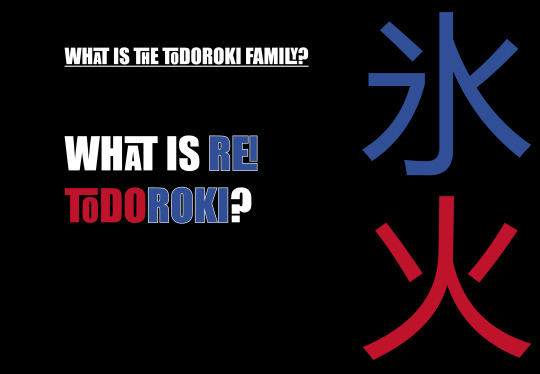
Rei is a daughter of prestige and her family’s last hope to stay relevant. She’s a woman raised in and trapped by the obligations, power, money, and structure of an old society that is doing everything it can to keep from crumbling.
But she’s also complicit in helping to uphold it. Rei is definitely a victim, but she’s also definitely a perpetrator. ‘Cause that’s how it works - people under the thumb of one kind of authority or abuse often perpetuate it and continue the cycle.
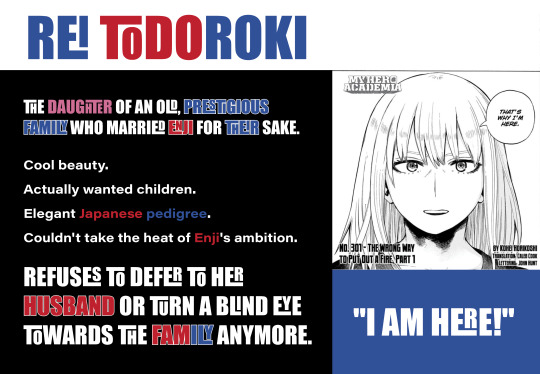
Rei’s given name means, as written, cold. It’s simple, but fitting. She is often emotionally unavailable and unable to connect with Enji and her children (especially Toya, but that’s a two-way street.). It’s one of the contributing factors to why she didn’t “see” her son.
Yuki-Onna and Yamato Nadeshiko
A yuki-onna, or snow woman, is a figure from folklore. They are described as beautiful women who appear on cold and snowy nights. The Wikipedia page I linked gives a good picture of the wide variety of yuki-onna stories out there and of the nature of this figure for your reference. But Rei, while a more human character, definitely suggests a yuki-onna. I think the stories that associate the yuki-onna with children, specifically the one where she asks strangers to hold a child (and survive holding it, in which case she generously awards the holder) or associate her with mountains, are the most interesting for this discussion considering the other mythological and cultural associations present in the Todoroki family.
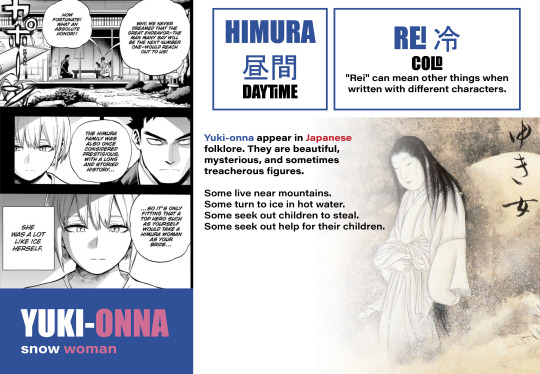
Rei is also a sort of yamato nadeshiko figure, or an idealized Japanese woman. TVtropes did my work for me on this one:
“Being a yamato nadeshiko revolved around the Confucian concepts of Feudal Loyalty and Filial Piety, which…meant acting for the benefit of one's family and obeying and assisting authority figures…Virtues include(d) loyalty, domestic ability, wisdom, maturity, and humility.”
A nadeshiko is, in English, a dianthus. I know it by the colloquial name Sweet William.

The white-edged flowers kinda looks like Fuyumi’s hair, no?
However, Rei is a yamato nadeshiko with a twist! Rei’s character starts out as a doormat, totally broke and unable to handle life in the Todoroki house, and then later finds the resolve and underlying “iron will” to face Enji, the family, and her mistakes again. Women aren’t naturally “perfect” in any sense of the word, ever, and they definitely don’t naturally (or even unnaturally, even through dogged effort) fit the mold of the yamato nadeshiko (at least, not every waking second of their lives.) But they can grow stronger over time, just like everyone else can. Rei becomes more like a “true” yamato nadeshiko after she stops trying so hard to be one for the sake of upholding her marriage and socially-acceptable appearances and instead approaches the situation from a place of collected, experienced resolve.
Yamato, as all these sources’ll tell ya, is an old term for Japan. “Yamato” is the name of the clan that set up the first (and only) Japanese dynasty as well as the name for the actual seat of government they created (and yeah, the Yamato seat was located on a mountain.) Today, “Yamato” is also the ethnic majority of modern Japan. Wikipedia has the most succinct brief on how Japan, despite its efforts to brand itself as one homogenized and harmonious Yamato people, definitely ain’t one.
Likewise, the yamato nadeshiko was a propaganda tool to encourage women to behave “correctly” and paint the picture of a desirable Japanese woman. The unreasonable expectation of women to reach the standard of the idealized yamato nadeshiko was, and is, total bullshit.
Miai and Traditional Marriages
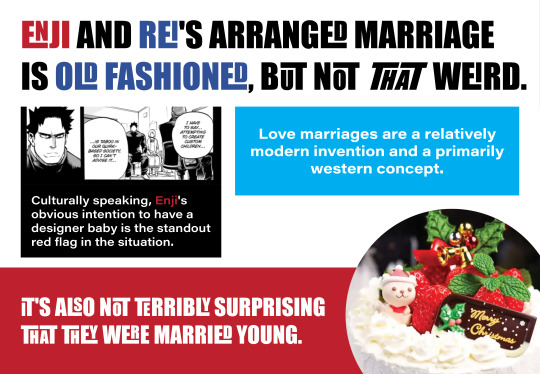
It’s old-fashioned, but not scandalous or inherently skeezy that Enji and Rei had an arranged marriage. Miai, or matchmaking meetings, are still a thing today in the real world and would likely continue to be a thing in the analogous-to-the-real-world’s-present future setting MHA presents, especially for someone like pro Hero Enji. He didn’t have the time or interest to date around, and he needed a marriage of business and mutual interest rather than love (and I don’t just mean “marriage of business” for the purpose of producing designer kids, though that is absolutely what he did and everyone involved even knew it.) Rei’s family are also exactly the kind of family that would desire miai to arrange the most mutually beneficial marriage possible - regardless of Enji’s involvement.
In the grand scheme of history, marriages for love being the accepted norm is exceptionally modern, and while love marriages are increasingly common in many places including Japan, they certainly are not “traditional”. Here’s a blog about Japanese marriages written in 2002 that may contain some interesting tidbits bridging the new and old traditions. Here’s a brief history of marriage in Japan.
Also, Enji and Rei were married young. Overall, the Japanese, especially women, are expected to marry young, though the mean age for women at their time of marriage has increased as time has passed. There still exists, especially for Japanese women, an expectation to marry younger, or at least marry while “in their prime”. If you watch anime, you likely already know what a “Christmas cake” is in modern slang. (That article does a fantastic job of illustrating western envy and postwar Japanese cultural shifts using the adoption of the Christmas cake as a case study.) If you don’t know, a Christmas cake is a slang term for an unmarried woman over 25. Because apparently, a day over 25 means she is past her prime for marriage and has “expired”.
Marriage fulfills certain social obligations even among middle- and lower-class Japanese citizens, but while Rei would not be alone in feeling the pressure to get married for the sake of her family, she would feel it the most acutely because of her status.
Appearances and Divorce in Japanese Society
Rei could divorce Enji, it’s true, if she had his agreement to do so or if she had sufficient evidence to prove it in a Japanese court. Which, good luck. Because while we know Enji was brutal and abusive in training, which parent actually burned Shoto and left a lasting scar? That’s right. Rei did.
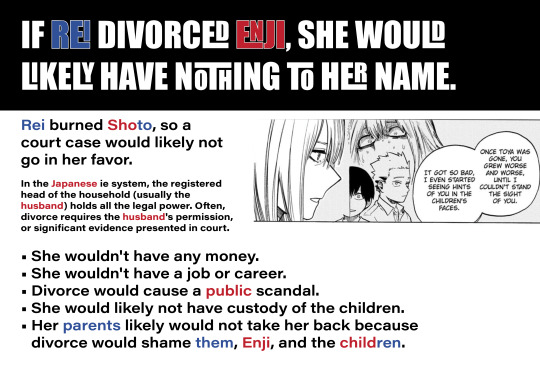
So Rei’s divorce likely would have totally fucked her and the children over. For one, she’d be stripped of the Todoroki family name and likely any Todoroki assets, and since she’d be breaking the deal made between Enji and her family, her own family likely would not take her back!
Divorces are becoming more common in modern Japan, but it’s important to remember that the stinging double-standard of “divorce is okay, except if it’s ONE OF US” that the upper classes (or just the exceptionally proud or wealthy) impose on themselves is brutal. If the public knew Rei had divorced and were given no context - which they wouldn’t get because shaming one’s (ex-)husband and family by sharing those details publicly would be considered crass and unthinkable - the public would likely rip her and the children apart even if they ripped Enji apart, too.
Remember: keeping up appearances is everything in Japanese society.
Rei living outside the house in a facility for her mental health is already shameful and potentially scandalous enough, and it wouldn’t do her any favors in court regarding custody of the children, anyway. Instead, she chooses the limbo of remaining married, but separated.

The Rindo Flower
Yes, I have read meta about Rei’s favorite flower being a rindo flower. I’ve seen it in this post from @foundouthatdabiistouyatodoroki and on Reddit, as well as just, like, around the fandom. I agree that the flower’s presence is often a stand-in for Toya, but I also think it stands in for the ghost of Enji’s, well, not exactly love, but his affection and promise to Rei made via their marriage.
Remembering that Rei likes a flower and showing that he remembers is kind of, like, the bare minimum, but it’s somethin’, I guess.
The rindo, most likely the Japanese gentian in English, is, well, a gentian.

The flower’s color suggests the indigo of the aizome dye, a traditional Japanese color, and its meanings include compassion for sorrow, justice, and… victory. When held upside down like Rei presents it during the hospital scene, it implies loss. (The gladiolus, which the article mentions as another flower of victory, is named because the leaves and shape so resemble a sword. Well, to the Romans, the word for “sword”, and was also a euphemism for a dick. Gladiators, or “sword-ers”, were talked about in terms of their masculinity, victories, and how many other things they penetrated with their “swords”. Real classy. Source? All my history classes.)
Considering Rei’s status as a sort of “blue blood”, I think it’s interesting to note that gentians are the flowers that appear on the Minamoto crest (though the crest most likely uses the less-specific-than-the-rindo balloon flower from the same genus.) I don’t know if associating Rei (and her kids) directly with one of Japan’s major noble clans (and the same one that the Tale of Genji centers around) was Horikoshi’s primary intention, but I think the connection is still worth talking about.
As that Wikipedia article can tell you, the Minamoto name was once given to imperial family members who could not inherit the throne through the family line. It’s fitting for Toya, considering how his father decided he couldn’t be a Hero that surpasses All Might despite being the firstborn son who was created for that explicit purpose.
Let’s talk about that, actually.
What is Toya Todoroki | Dabi?
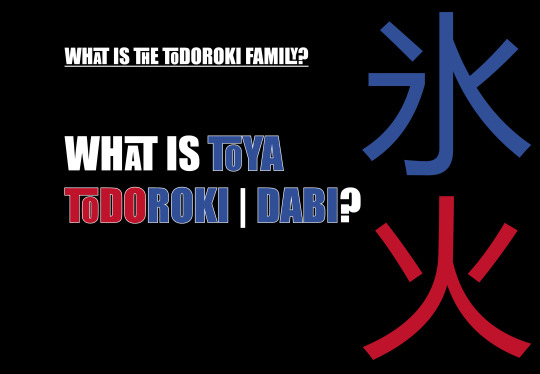
What is Toya? He’s the first son of a wealthy family with noble blood in him who was utterly crushed by the thought of failing to uphold the social obligations into which he was born.

Personally, I consider Toya to be the most fragile major character in the entire series, contested for the spot only by his own father, Shigaraki, and possibly early series Bakugo.
Toya, or more precisely Dabi, is Enji (and Rei) Todoroki’s very own monster. Instead of a “perfect creation” like intended, he became, well, whatever you want to call Dabi.
But let’s talk about Toya first.
The Role of Firstborn Sons in Japan
Firstborn sons are fucking important in Japan and in many other eastern cultures. Generally, they are obligated to inherit just about damn near everything and, in return, are tasked with basically all the responsibilities of honoring their parents. A Japanese family isn’t just a series of blood ties, but an institution. This system, called ie, has its own legal rules. Under the ie system, the firstborn son and his wife (who is likely doing most of the caretaking) live with the parents to continue the household. The other kids are expected to marry out or go start their own families.

Of course, not every single family follows these rules, but the social norms and pressures to uphold them exist. This academic paper written in 2007 analyzes why certain children in the birth order may live with (or near) their parents and explores several factors that impact this decision within families (usually related to whether or not the parents are providing childcare for the grandchildren.) Here’s a fun quote from page 3:
“...the first-born child generally lives with or closer to his/her parents than the second-born child, a result which is consistent with both our theoretical model and Japanese social norms. Second, there is one exception. If a first-born child is a female and she has at least one younger brother, then she locates farther away from her parents than her younger brother even though she is a first-born child.”
More on that “second” part in regards to Fuyumi later.

But, like with most cultures, the more traditional (and established and wealthy) a family is, the heavier the predetermined responsibilities of each household member weighs on them. And Enji Todoroki’s family is high-profile. So, you can imagine that the pressure placed on Toya is immense.
The pressure placed on firstborn son Tensei Iida was immense, too, but their family dynamic was totally different. The Iida family was, like, healthy and functional. Wild.
Moving on. So Toya was not only youthfully excited to impress his father and support his family as the firstborn son, but he was also, in a certain sense, socially conditioned to want to do so.
To me, this is where things get interesting. Toya’s struggle is not against his parents for crushing his dreams of a life beyond what they and their society’s established roles provide him. Instead, it is the opposite. Toya’s parents are ready to shake up the established family formula and free Toya from many of the obligations of firstborn son duties. Toya is not ready for any of that newfangled modern sensibilities nonsense. According to tradition, Toya’s role and life should be set and secure.
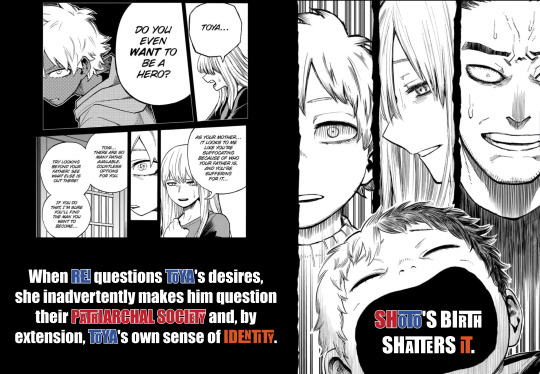
When Rei asks Toya if he even wants to be a Hero, she inadvertently makes him grapple with the possibility that carrying on the family business (or at least carrying on the to-be tradition of becoming the Flame Hero and surpassing All Might per his father’s wishes) is not a given. Other choices exist. Rei’s question, while well-meaning, creates a fissure in Toya’s faith in the patriarchal system from which he developed his entire identity.
If Toya, the first son, can’t use his flames, isn’t a Hero, doesn’t inherit, and won’t continue to live with the family, who is he? If he doesn’t fulfill that role and those obligations, is he worth anything to anyone, even himself?
Conventional wisdom says no. He would be a disgrace and a failure even without Enji’s dumbass “create a genetically ideal child to use the ultimate flame quirk to surpass All Might” scheme in the mix. For Toya, it was never about surpassing All Might, not really. It was about fulfilling his household role and showing his father that he was worthy of being in the family.
When Shoto was born, Toya saw that door slam shut. After that, his inability to embrace another way of life leads to his undoing. But he is also, you know. 13.
Toya, through no fault of his own, cannot handle his father’s flames - not his flames of sheer power, not of mindless effort, not of personal fear, not of burning western envy, not of national pride, not of anything. But Enji burdened Toya with them anyway.
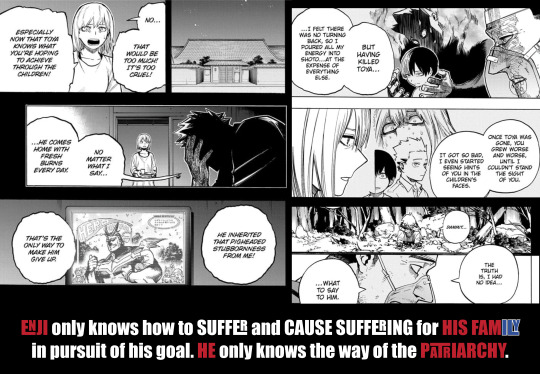
Arrows, Hamaya, and All Might
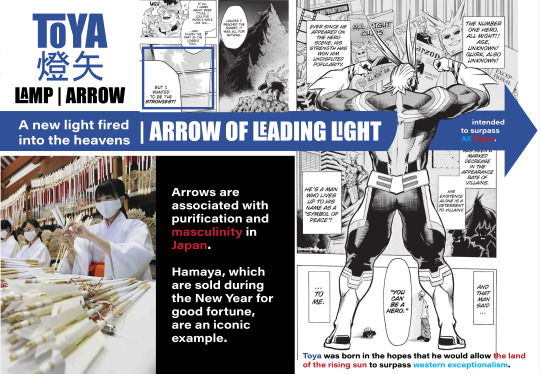
The characters in Toya’s given name mean “lamp (or, like, a light)” and “arrow”. @skyflyinginaction and their mutuals have an early discussion about his name and its possible meanings as well as a discussion about symbolism here that’s fun to read, and I’m always happy to not have to do any more work - er, happy to give credit where it is due for research and thoughts. But I do have more to add.
Arrows and archery have particular connotations in Japan. The ones I most commonly think about are hamaya, or evil-warding arrows, used ceremonially. Hamaya can be purchased at temples to be displayed in the home as luck-bringing or evil-warding items. Of course, the bow is also a significant evil-warding symbol, and the bow and arrow are often meant to appear together as a set of evil-warding objects, but yanno. Whatever works.
Anyway, around the New Year, archery contests and traditions abound as a way to predict the coming year’s fortune or ward off evil. This blog entry details one day of tradition in Ibaraki as well as the associations with masculinity and, erm, promoting fertility.
There’s one more tradition I learned orally, so I can’t source it, though the purpose for it was different than the one I just linked. In the one I was told, the head priest opens the yabusame (horseback archery) ceremony by firing an arrow through the temple gates and off the side of the mountain to slay an invisible demon. The firing coincides with the sun’s placement and becomes, much like Toya’s name suggests, an arrow of light.
In any case, arrows are associated with luck, sons, and warding off evil. I get the sense that the “arrow” in Toya’s name brings all of these cultural associations into play. More specifically, I get the sense that Toya was meant to be the “arrow of leading light” meant to slay the “evil” of the west, All Might, and purify that uppermost and unreachable peak where All Might stands in Enji’s mind. Don’t quote that, though.
‘Course, the “guiding light” or “purifying light” implied by Toya’s name eventually becomes perverted from its original purpose.
Toya’s Cremation
According to the manchild himself, Toya died not when he burned the shit out of himself on Sekoto Peak, but when he thought his family had replaced him. That’s when he says Dabi was born.
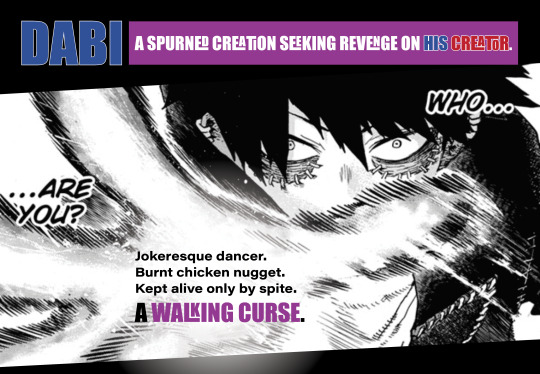
The word Dabi means cremation. Heh. The enthusiastic @foundoutthatdabiistouyatodoroki posted about why and how it may be written as something indirect instead of something more direct for the sake of Japanese sensibilities.
I’d also like to point out that Toya’s body was not properly, ritually buried or cremated in any sense or tradition. This is important, since the failure to do so often prevents the spirit from passing on to the afterlife!
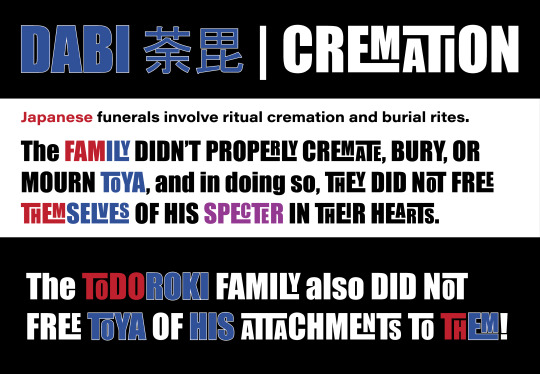
Arguably, Toya cremated himself, but not all the way and not in the way that aligns with the intentions and purpose of a kotsuage, or funerary cremation ritual. Also, his family did not pick out his bones - the authorities did when they found a piece of his jaw. That linked article talks more about the significance of the tradition, but put simply: the family didn’t properly mourn Toya, and in doing so, they did not free themselves emotionally of his specter. They also didn’t free Toya from his attachments to them.
This life-to-death stuff is a two-way street, and Toya’s soul was left hanging onto a burned, rotting corpse by the thread of his own grudge. He’s a modern horror story.
Dabi’s Horror Inspirations
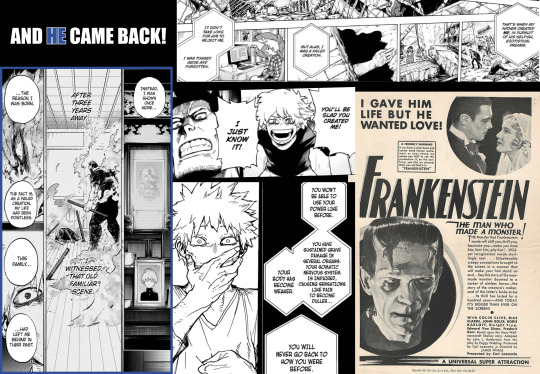
That’s right, Dabi fans! It’s time to talk about the well-known Frankenstein allusions present in the character - though I’m pretty sure Horikoshi pulled from the 1931 film and not the book. Whatever.
As Toya, Enji’s creation was an ice quirk + a fire quirk instead of a (cold) corpse + a reintroduced (hot) spark of life (and later, half of his “father” Victor Frankenstein’s own brain) like Frankenstein’s monster. Frankenstein’s monster’s weakness, at least in the movie, is fire. In the book, fire is still present and double-edged.
As Dabi, Enji’s creation is a reanimated corpse (wow!) + a twisted sense of self created from Enji’s own will (wow!) who seeks revenge on his creator and family for his loneliness and creation. His weakness is, uh, yeah, it’s still fire.
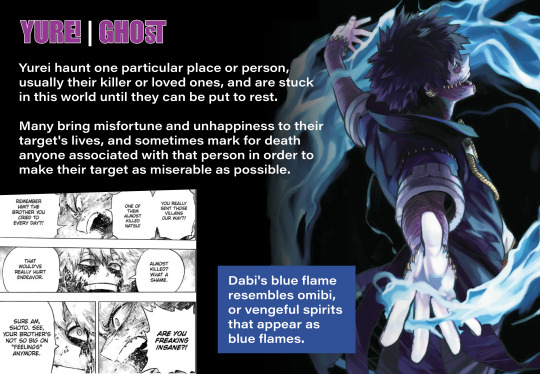
While Enji is not the one who recreated and revived Toya as Dabi, it is Toya’s grudge (and desire to see and be seen by his father) that keeps him alive. In fact, Dabi is a really cool twist on a yurei or perhaps an ikiryo since he is technically still alive. Still, Dabi most closely seems to follow the patterns of an onryo, which is a more specific form of yurei. These spirits, and the story of one in particular, are the inspiration behind the Japanese Ju-on: The Grudge movies (and then their US-made counterpart.) Here’s a bit from the onryo entry from yokai.com not ‘cause it’s the most academic, but the most succinct:
“Their motive is always the same—vengeance. Onryō are easily powerful enough to kill anyone. However, they prefer letting the object of their hatred live a long life of torment and suffering, watching loved ones die in their stead. Onryō inflict a terrible curse on the people or places that they haunt. This curse can be transmitted to others like a contagious disease, creating a circle of death and destruction far more devastating than any ordinary ghost.”

You may decide that the entry for the gyoro or another yurei suits Dabi better, but surely you see the point that he’s playing the role of some kind of ghost. His eerie blue flame suggests onibi, or resentful spirits taking the form of blue flame. Wikipedia also does me a big favor by mentioning the overlap between onibi and European will o’ wisps, which usually lead people astray towards goals they can’t reach!


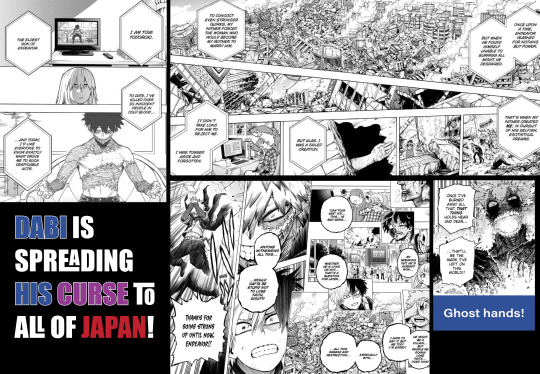
It really would have been better for everyone if Toya hadn’t pursued the incredibly hot blue flame, huh? Instead, he just burned out fast. Kinda dissappointing and anticlimactic - like a dragon’s head on a snake’s body.
Yeah, that’s right - Dabi seems to have renamed himself “dissappointment”. Heh. Tweens and teens really are the funniest people on the planet.
The First Son Passed Over for a Second Time
But perhaps the funniest and most horrible detail of the whole manga is the implication that All for One and the doctor took one look at Dabi’s shambling corpse escaping from the nursery and went, “Yeah, let that one go. He’s a little too pathetic to be the next vessel or organ for infinite hatred to fuel our big schemes.” Like, absolutely nobody (except the very family he thought replaced him, and boy, are they a shitshow), not even the villains that seek out pathetic people in order to use them, wanted Dabi.
Dabi is, in many ways, Doctor Garaki’s “First Son” vessel experiment for All for One, and he was passed over in favor of Shigaraki in much the way Toya’s father passed him over for Shoto due to how unsuitable a vessel he is.

When Dabi faces Geten, the ice-quirk user whom ReDestro treats almost like his own successor, who believes that a powerful quirk (and strong sense of individuality with a need to express it) is the only thing that makes someone worthy of living, who exists as his weird mirror with a more weaponized and powerful form of Rei’s ice quirk, I wonder if he thought god was laughing at him. I know his face and skin began splitting apart as if to show his true identity (a dead kid upset at his family) and show a waver in his resolve to stay alive to accomplish his goal, but I’d love to know if he has any ideology outside of his grudge towards his father and family.

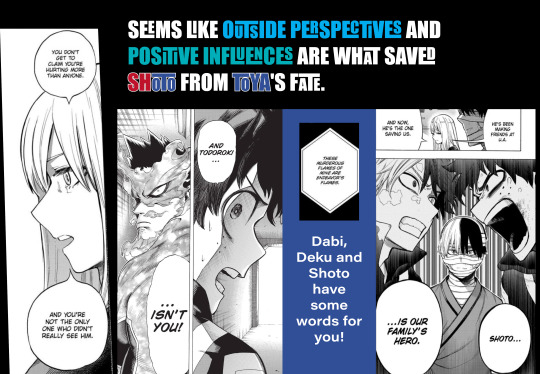
If Hawks told Dabi to his stapled face his real reasons for helping Endeavor, what would Dabi say? Heh heh heh. Dabi learned not to trust Rei, Fuyumi, or his own brother Natsuo, so I’m not terribly surprised he never trusted Keigo in the first place.
Keigo, who never thought to watch Dabi. Keigo, who had to ask who Dabi is. Keigo, who also didn’t see him.
Keigo, who wants to take Toya’s place.
But let’s talk about Toya’s other siblings... in part 2!
#todoroki family#bnha meta#bnha manga spoilers#dabi#toya todoroki#enji todoroki#endeavor#shoto todoroki#shoto#rei todoroki#fuyumi todoroki#natsuo todoroki#hawks#keigo takami#todoroki presentation
309 notes
·
View notes
Text
The Menu, to me, is such a fascinating movie. I'm going to come back to it and watch the way it's filmed more carefully. but the first time through is such a tantalizing and layered discussion about work, wealth, and inevitably life under capitalism.
What I particularly love about it is that at a very surface level reading it offers a sort of "introduction to systemic inequality," an easy to swallow metaphor of humanity literally consumed by exploitation to the point of annihilation, wrapped around a peppy little survivor girl finale. For me, stripping away all the tasty deeper subtext, it still fulfills the most basic component of a popular film, which is "having a good time." You do not need to try and "get it," you can simply enjoy it by itself if you like.
However, as soon as we get into the finicky details of the movie, especially our "final girl," it starts to get really interesting because the initial surface metaphor starts to fall apart and demand a more complex level of thought. (This will feature some spoilers.)
What I find fascinating is that our protagonist is a sex worker. The entire grand metaphor proposed by our chief antagonist, the chef, is you can divide the world into the served and servers. He has arranged what he thinks is a perfect and flawless illustration of this grand truth, and one unforeseen change fully undermines his entire thesis. She's a worker who provides a service, she's someone getting served by workers in the process of that service. Her job and her life weaves between both worlds and although it's possible to make some larger sweeping generalization, to do so would take the nuance away from the lived reality of most people who are at once point or another both things. This undermining of the chef's thesis is very much the point of the movie, not to suggest there is no class or wealth inequality, but rather as an entry into moving past the surface level binary view of "haves and have nots" into a more complex idea of how wealth and power affects people in different places of the hierarchy.
The movie itself presents each new act as a new item on the menu, which is a well-considered choice, as each step forward reveals more information that builds the complexity of the ideas in the movie and whets your appetite to consider it further. The plot, the characters, and the action in the film progress in a way that mirrors the kind of experience the menus title cards before each segment are describing. The restaurant itself being totally isolated, with every employee committed to their jobs with a cultish intensity lays a groundwork for the production of the idea that individual lives are disposable not just in the literal sense, but metaphorically, a quick sketch of the modern expectations of a workforce by capitalist society to consider their personal lives as disposable in comparison to their jobs. Ralph Fiennes' casting as the chef adds a kind of metatextual level to the proceedings, as he himself is an aspirational actor for many other working actors in the film industry. The way he is worshiped by his devout employees while viewed as someone meant to perform on demand by his employers is the kind of deeper exchange that our modern hierarchy expects from us. You can find a higher place in the world so long as you are always willing to trade yourself to anyone who can afford to purchase you.
This level of exchange, where we as individuals are the actual consumable goods in some way is more at the heart of the Menu than a simple binary division of class. It is also the reason to have a protagonist who is, in a literally sense, her own medium of exchange. The surface metaphor of everything as transactional and finite is deliberately broken time and again, because the antagonist, a chef, is unable to see a world more complex than his own route of understanding it, through food and cooking. He sees everything as abstracted, consumable without any possibility of restoration, resources as something which can only be exchanged but never increased or distributed. He is not the villain in the movie, that role remains with characters like the stockbrokers, the old wealthy gentleman, and our protagonist's date for the evening. But he is the antagonist because of his fundamental idea of the world aligning with the villains (even while ostensibly there to kill them) and in conflict with the fundamentally reasonable position of our protagonist, that she ought to live.
I would enjoy dissecting The Menu scene by scene because there's simply so much going on in it, for me personally. I think there's something excruciatingly interesting to be said about the protagonist being a sex worker, in particular because the movie itself does not chose to view this in an exploitative way, but rather uses it to serve the larger idea that humanity cannot, in fact, be broken down into a consumable resource alone - that giving of yourself does not mean a loss to yourself. I also believe there is a distinct turning point in the movie where Ralph Fiennes sits down at a table, which is to me a huge change. It is the movie making an effort to draw a line under the real thesis, that even the antagonist who insists throughout the movie that he exclusively exists as one who serves, who gives himself up one bite at a time until he is exhausted, even he is someone who cannot exist in his own idea of a false binary.
The chef here is not wrong in recognizing the existence of exploitation, or even necessarily incorrect in his ideas of addressing it through violently usurping those in power. I would argue that overall the conclusion of The Menu doesn't disagree with the notion of hierarchical exploitation innate to modern society. If anything, it serves to illustrate even more how much this trend is ultimate a downward spiral of inevitable and total destruction.
However, it is a movie that is meant to be optimistic, a movie about hanging on to our human connections even when we have some exchange between each other. It's about caring for other people, caring about what they do for us, or caring about what we do for others. The conclusion, and our survivor girl, are a recognition of that hope and that potential which still exists.
(edited from bad casting memory)
312 notes
·
View notes
Note
I didn't see anything from somerton until about a month ago when he popped up in my recs and I ended up binging his content for about 2 days, but something kept being off and I noticed some of the lies/ignorance, and there was something really dismissive and weird about how he talked about aspecs and women in particular... I stopped watching him cause I watched one of you guys' podcast and realized I also just felt like crap after his videos.
I did end up getting his rwrb video in my recs when it came out cause of the binge and I just remember leaving a comment about the way he talked about aces in it. It was especially upsetting seeing people in the comments who were simply happy he mentioned aspecs at all. He replied to me just saying his cowriter was ace. I don't reply to youtube comments but I just remember wanting to point out that same co-writer he was using as a shield said aces don't face discrimination or conversion therapy, and in that video wrote that aces have to have sex to find out they don't like it. Being something doesn't make you instantly know everything about it, as somerton himself demonstrates with his ignorant comments about gay history.
I'm not really one of his victims since I avoided him as soon as I found him, but I feel bad for all the people he tricked and/or guilted into believing him. I hope some other creators make videos exposing the weird way he manipulated the queer community, cause I think a lot of young folks could use a breakdown of it.
Anyways I just wanted to finish by saying I love you guys' work and learning from you. You helped me understand why certain phrases make me upset, and that and watching your podcast back to back with his videos helped me figure out what I didn't like about Somerton, so you helped protect me from him and not convince myself I was just being Weird as I often do when I get Bad Vibes from someone.
Thank you so much for reaching out <3
It's so fascinating that you stopped watching Somerton after finding us. We've tried to keep things as professional as possible these last 2 years by only citing directly harmful things he's done to us and direct members of our community, and even then it was sparingly and as kind as possible.
When we first spoke with him about including Asexual representation in his future Telos endeavors, he assured us that not only was there already an Ace in the writers' room, but that two real, fully-fleshed out Ace characters were already being written. This was encouraging! After all, we had no way of knowing if he was the kind of cis gay man who loathes Aces or doesn't view us as queer. Since this didn't seem to be the case and rep is important, we supported him. We now deeply regret not doing our research on him first.
Even before his video "The Queer Erasure of Asexuality", we started watching a few of his YouTube videos for the first time and some of the subtext was NOT kind to our community. Subtle things that we'd see get repeated by his fans over and over again, like how queer art is bad these days because all the "artists" and the "exciting queers" who "really lived" died in the AIDS crisis. Or the implication that the Interview with the Vampire reboot was *more queer* because the vampires actually had gay sex on screen, despite this being a complete departure from the source material and neglecting the fact that Anne Rice's vampires have always been undeniably queer *and also* sexless. In fact, we didn't say his name, but we did mention some vague "bad takes" we saw about the series in our podcast episodes 75 & 76 The Triumphs and Failures of AMC’s Interview with the Vampire Part 1 and Part 2...At least some of those came from James.
We did not see his rwrb video, because we had long given up on him by that point, but it is not at all surprising to hear that he had bad takes and also hid behind Nick once again to shield himself from any criticism. It was very much his MO, and yet we're also certain we've heard him chastise straight women for using the "I have a gay friend" defense.
It is so good to hear that our podcast has been helpful to you. There are FAR too many Aces who are willing to let bad behavior or ill-informed takes slide just because someone with a decent following noticed us. We deserve so much better.
#ace#asexual#asexuality#aces#ace community#ace pride#asexual community#asexual pride#lgbtqia#james somerton#hbomberguy#hbomb#todd in the shadows#the ace couple#the ace couple podcast#interview with the vampire#ace erasure#asexual erasure#compulsory sexuality#queer#queer community#rwrb#media analysis#video essay#telos#ace rep#ace representation#asexual representation
63 notes
·
View notes
Text
watching a thing that's going through why someone enjoys doctor who, and it's gone on a little tangent about why romance on doctor who doesn't work (in their opinion, and in mine), and how it made s2 and s7b the creator's least favourite -- and while I would need to rewatch s7b to remember that, I do think that the-doctor-and-rose at least doesn't have to be read as romantic if one doesn't want to
which isn't to say it wasn't intended as such, and also that it was somewhat based in dtennant and billie piper and jenna coleman and (to some) matt smith being hot (sorry matt smith, he looks like a teenage boy, the dichotomy is not hot or ugly, it's does-or-does-not-look-like-a-teenager), which is kind of *sigh yeah okay you're appealing to the people who think people are hot so they wanted a bit of that sexy sexy romance (I guess)*
however I don't think that things that are romance-coded need to be engaged with on that level, as someone who's had to make that translation many many times, and I think especially with the doctor-as-character, including and especially ten when one reads ten as being projected onto, it's actually incredibly fun not to/not even really a translation so much as a textually supported read
what's especially good about the doctor and rose dynamic is specifically that the doctor never gives rose the exact thing she's looking for, and that part of the doctor's heartbreak is that he can't -- take that as a "because I'm immortal and you're not," if you want (and that's also a textually supported read), but it's also very very easily read as "because what you want and what I can give is not compatible so that I will always end up letting you down like I do everyone, and I would rather you be happy than assert what I might want, and in the end everyone leaves for one reason or another"
which... the doctor basically says to wilf. they leave. they find someone else and fall in love. they forget. they break the doctor's heart. not just rose, but everyone. rose is simply the first to remind the doctor of this fact after bringing him back after a massive traumatic event
and I think it elevates s2, which I've now seen a couple of people go "oh because of the romance it's one of my least favourite seasons," which is so fascinating to me, because s2 isn't at all about a romance through my eyes. it is for rose, because she's in love with the doctor, romantically, and that's part of her tragedy, as a mortal, as someone who's in love with her doctor and doesn't want that doctor to go or to change or to... be alien, perhaps (now I do reach, but it's open to reaching) -- and who is growing up throughout, as the first person one sees grow up in nu!who
and the doctor is constantly struggling for words: tell rose... oh she knows. and i suppose. if it's my last chance to say it. rose tyler...
rose tyler essentially brought the doctor back, made the doctor fall in love with the universe again, and brought back a childlike wonder that the doctor had had before the timewar, and how do you encompass that into simple human concepts of "romantic" or "platonic" and know
that this person is romantically in love with you in a very human way
that there is an end-point to this, which is something this person will never fully grasp until it's happened (or that person is dead)
that you do not age. that you change. that you are aliene
that you are fundamentally, always, left on your own in the end
that you have put all of your sense of your new self onto this person and it will eventually fuck everything up
so yeah, there's some heavy-duty emotional subtext in s2, but because of the deliberate lack of clarity given to that subtext, it's very very easy to take it in various kinds of directions. of course rose and the doctor are Like That in s2, they're living a little fairytale life that's about to fall to pieces (something the doctor knows, but won't admit, and rose doesn't fully understand or believe)
when rose asks the doctor how long they'll travel and the doctor says "forever," it's absolutely 100% a lie, and that is... very tragic... thinking back to their first scenes together, which were incredibly simply sweet, and you know it's stretching thinner and thinner in ways I don't think you see with any other companion
the thing is I do personally think that rose as the romantic arc makes rose less interesting than she is, and that's a flaw in the show, but I think giving hers and the doctor's run a slightly different eye, that is absolutely supported by the canon, also opens up all of her other traits, that make her so iconic -- only seeing rose through the lens of romance does her a disservice, there is a bunch more going on there in s2...
but like yeah, I get that there was some david tennant so-called sex appeal, which, yeah whatever, and billie piper was a former famous popstar, and people also do ship them romantically (and that's fine), but I think to focus on that aspect in order to say why rose isn't appealing kind of ignores everything else she is and represents on the show for something you can just read in another way easily and more interestingly and supported by the text
like people will throw around "asexual doctor" but I don't think they know enough about aromanticism (which is what they really mean) to understand how to read that in a text. deeply symbiotic relationships can be aromantic, can be platonic, and can be one-sided or messed up or or...
embrace the symbiosis of the doctor and rose in s2 that is inherently also kind of fucked up and doomed because of their deliberate blinkered perspective of the future even after the sarah-jane episode and the madame du pompadour episode which are screaming at them that things are ending soon!!! It's compelling stuff. it's not necessary to read it as romantic
give rose tyler her due as the ghost that haunts the narrative
54 notes
·
View notes
Text
Some Thoughts on Sheldon Cooper. . .

"Leonard, I am overwhelmed. Everything is changing and it is simply too much. I need to get away and think." | 7x24 The Status Quo Combustion
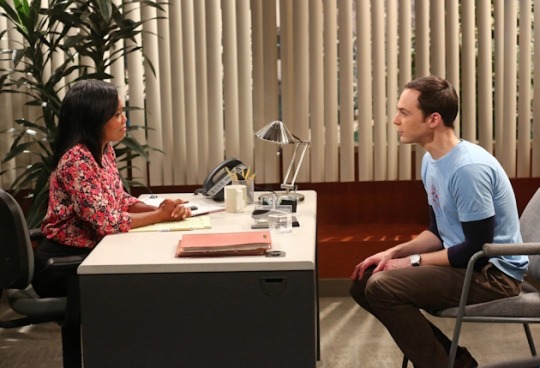
"Dr. Cooper, while you were away we came up with a solution that would allow you to change your field of study."
"Wow. Pouting and running away actually worked! Yeah, I must say, that may not be the lesson you want to reinforce with me." | 8x02 The Junior Professor Solution

"I'm not leaving your world. I'm just talking about living across the hall."
"I understand. Either way, I want you to know that I'm aware of how difficult I can be. So, I just want to say thank you for putting up with me." | 8x12 The Space Probe Disintegration
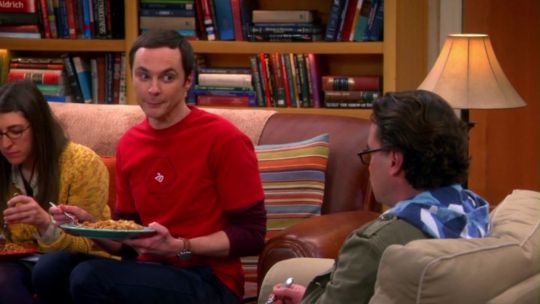
"It just seems silly to eat in two groups."
"It doesn't seem silly if you think of that group as being lead by a big, evil baby."
*a few moments later and everyone situated around the couch*
"Well, isn't this nice. Sometimes the baby wins!" | 7x16 The Table Polarization

"Two years ago I got my driver's license."
"What?! Why didn't you say anything?!"
"I like being chauffeured around. It makes me feel important." | 10x16 The Allowance Evaporation
These are some of the moments where Sheldon shows a level of great self-awareness. I bring these moments up as showcasing that Sheldon's level of emotional maturity is much greater than his friends (and the writers of this show) give him credit for. One of the main problems is how the narrative often treats Sheldon as if he is completely incapable of growth, maturity, or taking care of himself. The truth couldn't be further from this. Even the narrative itself shows how much Sheldon changed during his relationship with Amy. The primary problem is that Sheldon's personality is so big and overwhelming, he doesn't HAVE to change because he is able to get everyone to do what he wants anyway, which he is fully aware of and exploits constantly.
I mean if you are Sheldon, someone who has a mind sharper and faster than anyone you meet and prefer to have tight, tyrant-like control over your reality in order to feel safe and secure, pushing and manipulating people around to do your will is going to come naturally with the territory. The problem wasn't that Sheldon is a stunted adult who can't manage life on his own, but it is in the fact that Sheldon rarely got constructive and encouraging push back for his behaviors and choices. For when he did, which primarily came from Amy, he was fully capable of making corrections to his behaviors and expanding his worldview. It just ended up that he was either treated poorly and abusively or enabled and placated.
That's why I really love the moment with Mrs. Davis when he comes back from his train-riding "sabbatical". Changing his field of study was a HUGE cataclysmic event in Sheldon's life and was one aspect that was causing him the greatest distress. Yet even in this reality-altering experience, Sheldon realizes that some of his responses to it weren't healthy, and makes a note of it with her, e.g. don't reward my childish behaviors because I will take FULL ADVANTAGE OF THEM.
There was SUCH a missed opportunity there at the end of Season 7 going into Season 8. Penny realizing that she and Leonard needed to let Sheldon go, allowing him to make his own choices and do what he felt was right for him was a huge revelation for the characters. It was kind of a significant, paradigm shifting moment! I naively thought that they would build on that going forward in the show, but nah. Of course not. Any moments that would have allowed for such growth from all the characters were usually walked-back or dropped. It is such a shame, and makes the watching of this show frustrating for me.
And yes! I know! I realize this is a sitcom! Why am I expecting such highbrow writing from something that is primarily supposed to be comedic and entertaining? Well, I think this subtext was implied in the narrative despite itself, especially with Jim Parsons. I think his acting conveys a lot of Sheldon's complexity through his body language and micro-expressions. There is SO MANY LAYERS to Parsons' performance, I just do not see how you couldn't possibly get wrapped up in dissecting them and having higher expectations of the narrative you are watching. Jim Parsons MAKES this show, otherwise what else would it offer?
#anyway just my two cents#my thoughts#my sheldon cooper thoughts#sheldon cooper#young sheldon#jim parsons#the big bang theory
29 notes
·
View notes
Note
even as someone who does not ship the brothers (or deancas), i feel that there is no denying the heavy handed undertones of romance between them, and the writers' very intentional and frequent exploration into incestual themes, if one is truly understanding the show. however, it's also my understanding that a lot of hellers/deancas people/whomever use a frustrating argument that "sam doesn't really know dean" when in reality, he will always know dean better than cas. thats the whole point of the show. when dean and sam 'betray' each other from the other's persepctive, the person doing the betraying genuinely believes they are acting in the other's best interest, whereas with dean and cas it's always for personal benefit.
to stop the rambling, i wanted to ask, purely in interest of seeing multiple sides: if so many hellers were not so anti-sam and did not project so much onto castiel, do you think the fandom at large (outside of that group) would have less of an issue with the ship? again, i am genuinely curious and you seem both well established in the fandom and well versed in the show itself. i feel as though where other shows do have beef between shippers and such, the supernatural fandom is watching two completely different shows and so many of them are bypassing crucial parts.
Hey Anon!
I don’t ship Wincest either (though most Wincesties I know are cool), and I REALLY don’t ship Destiel. But, I do joke about brother husbands a lot and love the brothers’ codependency. Still, I don’t think the writers are actually ever suggesting there are true romantic feelings to Sam and Dean’s relationship. Or maybe I should say, I don’t think canon (or subtext) Sam and Dean are actually (even secretly) hot for their brother. However, I think the romantic parallels and even outright nods to incest are very deliberate (and obvious). Partly, it’s on brand for the horror/gothic genre of the early seasons, but it also serves the purpose of highlighting how important Sam and Dean are to each other. They are each other’s soulmate, life-partner, and number one, which are usually roles reserved for couples. Also, I think the show just likes to make jokes as well. It’s clearly deliberate when the show goes from having characters assume they are couples, to villains making incesty remarks about them, to Dean asking if Sam wants a divorce.
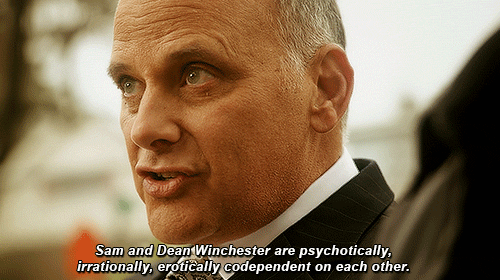
I agree that Sam knows Dean better than Castiel, or anyone else. And Dean knows Sam best. That being said, they don’t understand each other perfectly, and they speak “different languages” in terms of showing care a lot of the time. Sometimes this is works in a complimentary way that has them in sync (Dean loves his family, especially Sam most, and Sam needs to be Dean’s number one), and sometimes it causes friction between the brothers (Dean letting Gadreel inside Sam or Sam trying to cure MOC). But, I agree that MOST of the time when they “betray” each other it’s when they are trying to help each other, or at least it’s a byproduct of something they feel they need to do. They never treat each other as expendable. And I also agree that betrayals between Dean and Castiel just hit different. I think this is because 1) they don’t have the same obsessive love underlying everything they do to/for each other (despite what hellers think), 2) they are more brothers-in-arms than true adopted famoly until later seasons 3) Castiel is not human, and I believe that Dean (however subconsciously) treats him differently because of that, and Cass not being human also changes his view of the fallout his actions will have with the people he cares about, and 4) I agree that they both betray each other out of personal interest in thst they value other things/people more highly than each other quite often (Dean will always value Sam above all, and Castiel often values whatever mission he is on above the brothers or is at least willing to risk them for it to an extent).
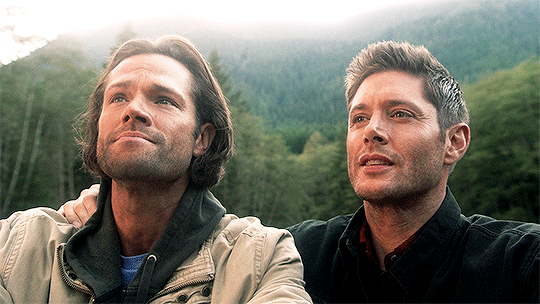

Feel free to ramble in my asks whenever you like. Clearly, I do it too, so no judgement here.
My short answer to your question is … yes. If hellers didn’t hate on Sam in a transparent attempt to make him seem less important both to Dean and to the show in general, I doubt Sam girls would care that people shipped Castiel and Dean. It’s the attempt at twisting canon and down-playing Sam that is frustrating. And yes, the projecting added significance onto Castiel is massively annoying because it shows a lack of understanding of the show, whether purposeful or due to ignorance. And that annoys everyone who cares about the “fscts” of the show. It’s also their insistence that Dean is bi … because reasons (often offensive, stupid and/or steryotical) that annoys the people who actually enjoy Dean’s true chracter, not the fan-fic woobifued version of him that hellers (and some AAs) fawn over. But, I think what pisses the fandom at large off the most about hellers is their insistence that they get their way and the tantrums they throw about being “robbed” when a ship that was clearly never going to sail in the show continued not to happen. More specifically, their need to hate on actual actors, writers, producers, networks and other so called “homophobic” fans who don’t agree with them is abhorrent to many.
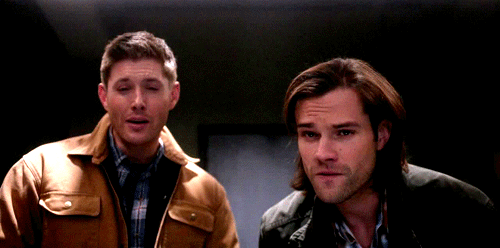
I agree with your final sentiment completely. It is like Supernatural is at least two totally different shows, depending on which type of fan you are talking to. I mean, there are arguably more than two versions of the show in collective fans’ minds, if we consider which of the brothers a group sympathizes with most and how they interpret the chracters’ actions (Sam is a whiny brat … Dean is an abusive monster 🙄). But, out of all the fan groups, there is only one who seems to be "watching" a piece of media that does not even resemble the actual show … and it’s hellers.

And to be clear, I’m not talking about Destiel shippers in general here, but hellers in particular. No one I know, including me, cares if people ship Dean and Castiel for their own enjoyment, but it’s the insistence they are right and attempted rewriting of canon (and threatening real people) that makes people ragey.
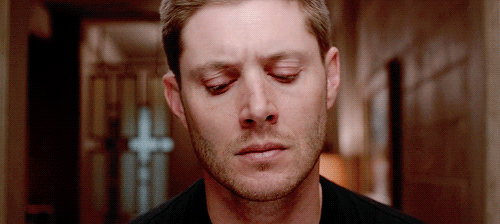
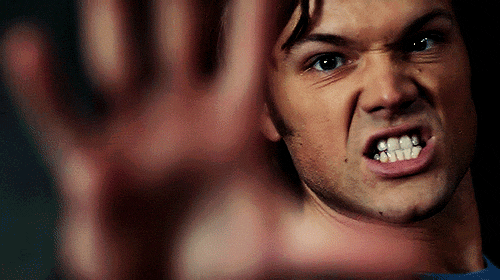
Anyway, thank you for your ask. I’m sorry my reply was so long. (This is likely one of the reasons I don’t get a ton of asks, lol).
24 notes
·
View notes
Text
THE BEAR S3 Predictions
Just a mental note I'm putting out here to be able to revisit it when the time comes to check its level of accuracy. I have the feeling that S3 is going to be the season of the reconciliations.
The relationship between Richie and Carmy is completely broken after the walk-in incident and Richie walks from The Bear. He happens to get some kinda job offer and accepts it just to prove Carmy wrong. They will later spend a good portion of S3 trying to repair their bond. By the end of S3 (hopefully sooner) there should be a reconciliation of some sort between them and Richie should go back to The Bear.
Nat gives birth to her new "cub" and this brings the family together. There is a reconciliation with Donna, which in some capacity benefits not only the siblings but the entire team, the restaurant as a whole. Not exactly sure how this will play out, but Donna will quit being this negative and toxic influence on everyone. Maybe she gets clean because she takes this baby as a new chance to start over and be a better grandmother than the mother she was. IDK...
Marcus' mother dies and this juxtaposition of new beginnings, births, endings, death, etc is going to be a theme throughout the whole season, that is why I actually think this funeral will be the opener.
There will be some kinda flashback episode, like 7 Fishes or a montage of some memory that has a huge impact on one or more characters. I have my $ put on the Sundays, Mr. Adamu and lil Syd would spend at Mr. Beef's. I strongly disagree with the weak argument that just because the Berzattos are catholic, their restaurant didn't open on Sundays. The gastronomic industry cares very little about those traditions especially if the place is struggling. I bet they were open every Sunday part-time, just for lunch, to get all the demand of those who went to church just because business-wise it makes total sense.
Carmen will apologize to Claire. Not sure what she's gonna make of that apology, whether she's gonna accept it or not, I hope she doesn't. I'm pretty sure there will be no reconciliation here. I don't necessarily oppose Carmy having a romantic partner and as much as I ship SydCarmy like nobody's business, I'm 100% sure they are not gonna happen any time soon. Maybe and this is a HUGE maybe, they could be the perfect cliffhanger for S4. But that would be a stretch. Not that Store & Calo couldn't pull it off, but still. So, basically, I am all for a new love interest being presented to Carmen just to see how he responds to it. After Claire he should go back to his old lone-wolf ways, I need to test that behavioral theory though, so I need a new female character to do it.
Last, but certainly not least, Miss Adamu needs her man and I'm not talking about Bear. I want to know more about Sydney's past and see her letting her hair down, putting her records on, and all that jazz. So, maybe an old flame can re-appear in her life and they can try to "reconcile". This reconciliation shouldn't work either because she's now devoted to making The Bear work and is basically a workaholic and both, Carmy & her get into this synch of type As on Speed and Red Bull, non-stop working machines, well-oiled now that they had already learned from their mistakes and The Bear succeeds but Sydney's relationship with her guy from the past fails, again. The guy feels like a 3rd wheel and lets her know that she's not in a relationship with him but with her job. Sydney understands the subtext, and this break-up is actually a wake-up call for her. She starts seeing what we all shippers are already seeing. It's not just about work for her. Yes, The Bears are too absorbing and demanding, both, the restaurant and the chef, but she doesn't mind. She loves it. Love is the operative word here. This realization should hit her hard by the end of the season.
The background of all the things I just mentioned above will be the BOH, fast-paced, chaotic, and working like a Swiss clock, just like Carmy likes it.
Am I missing something? Probably. Can't wait to find out.
Bonus tracks: I am pretty sure the wedding will either be Teff's or Fak's.
And lastly: When Sydcarmy happens, it will "officially" start with something small and inane like Syd accidentally finding out Carm has been drawing portraits of her all along... CHECK THIS OUT, I think Storer & Calo have something like this in mind or along these lines, and it should come along in S3, minus the sex part.
#the bear hulu#the bear fx#carmy x sydney#syd x carmen#carmen berzatto#syd adamu#sydney adamu#GINGERPOVS
27 notes
·
View notes